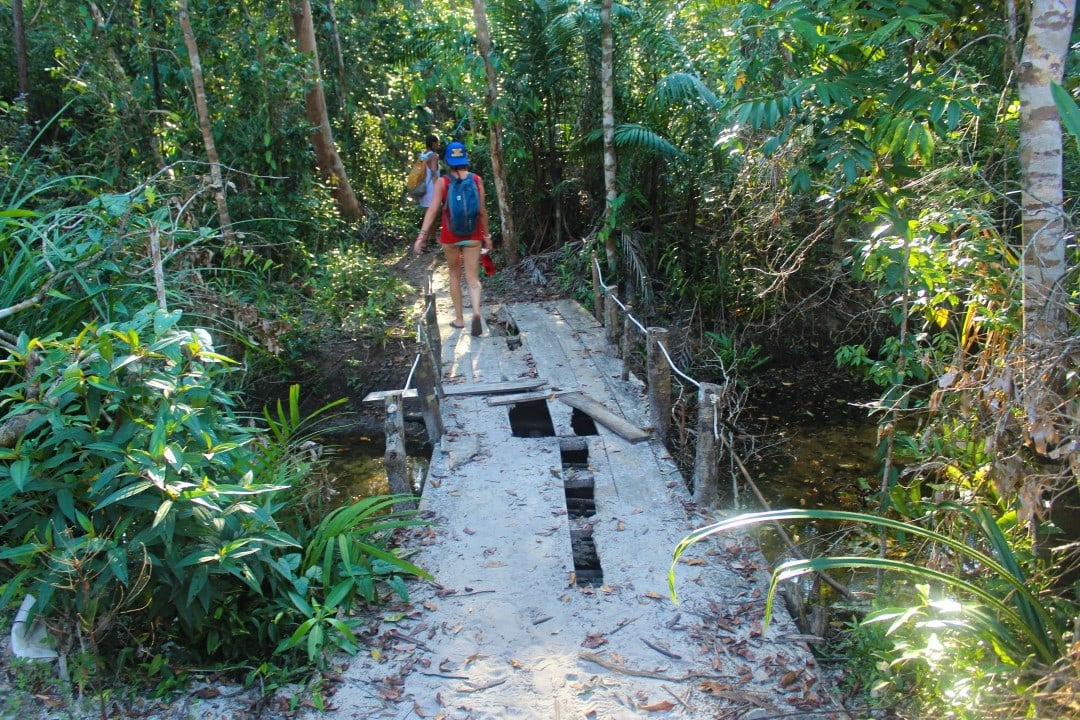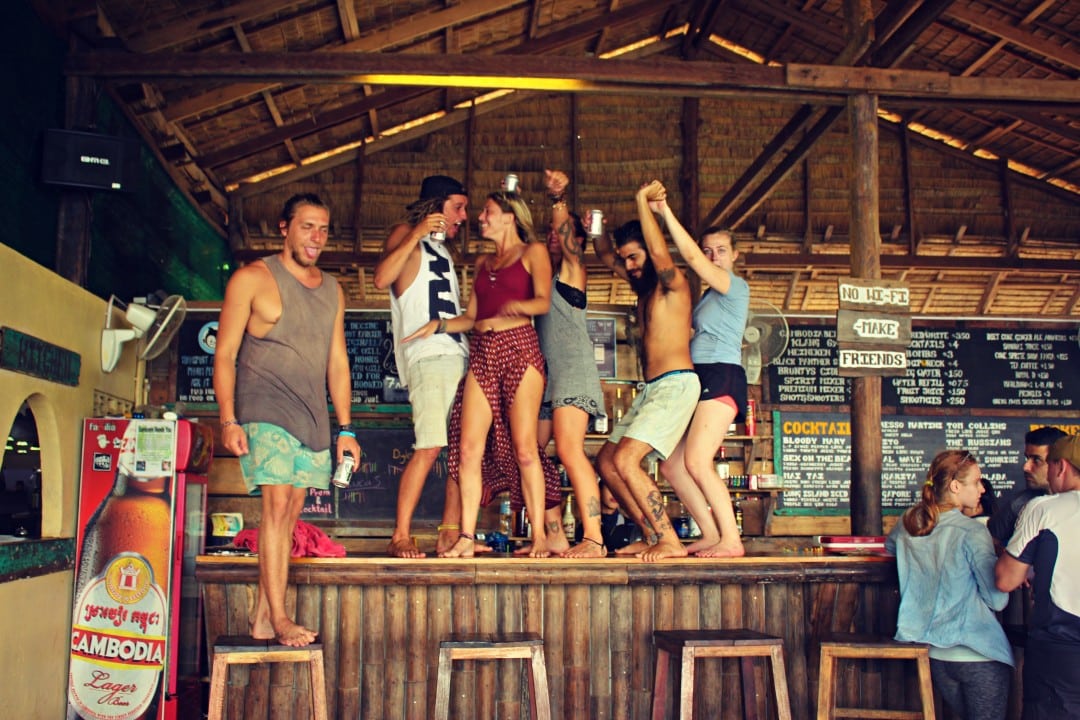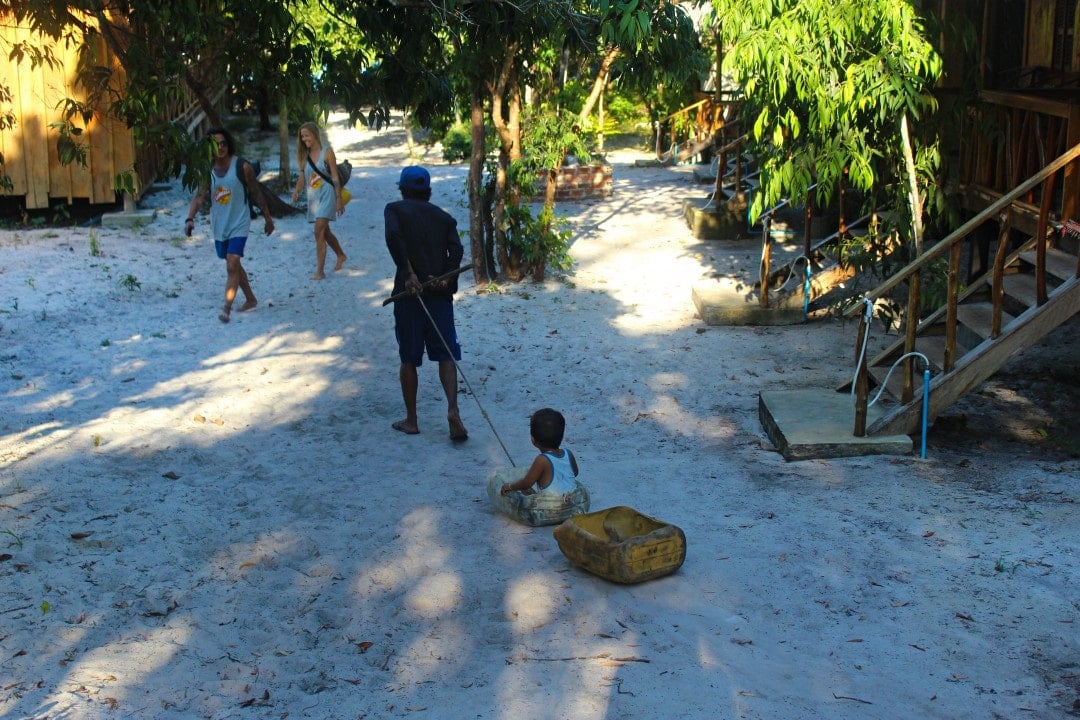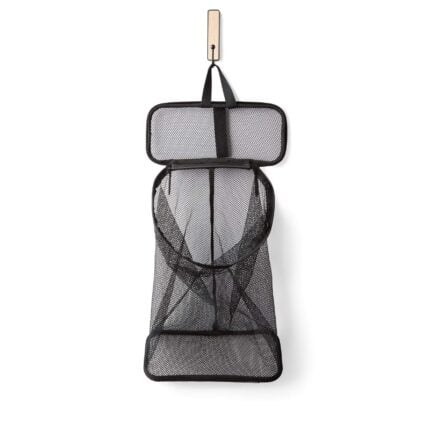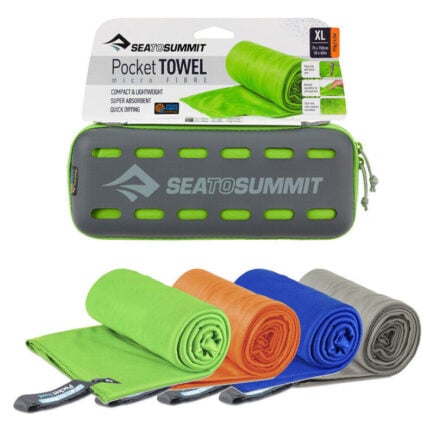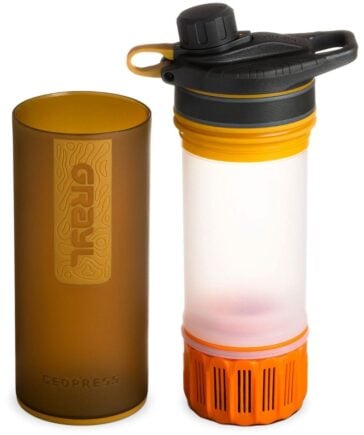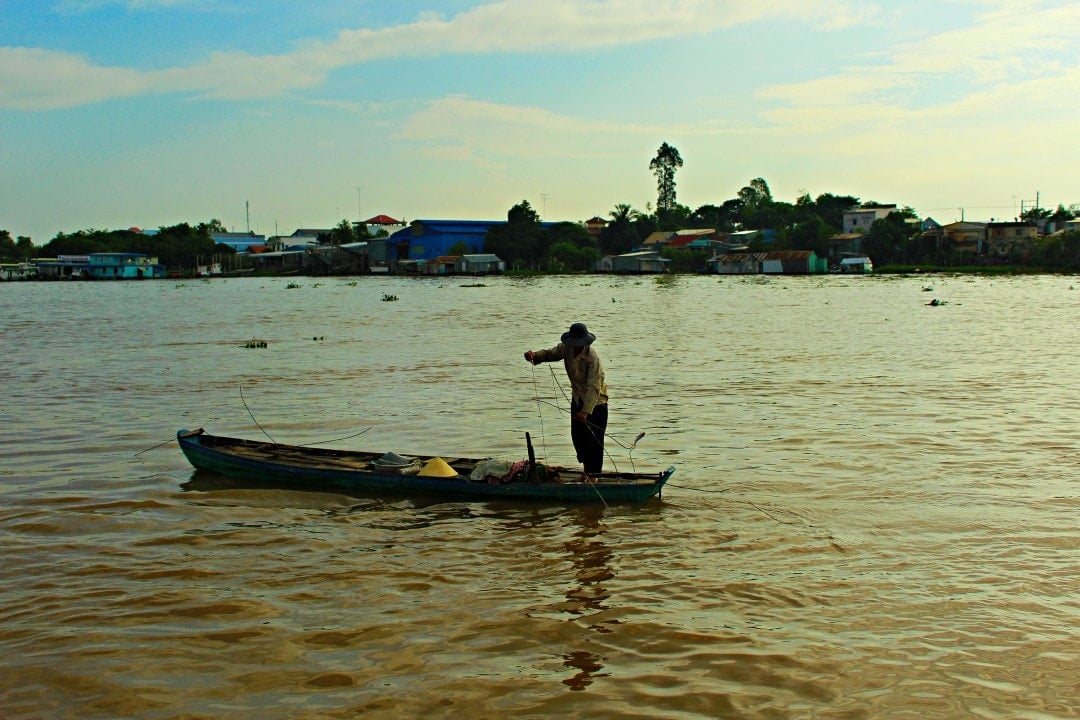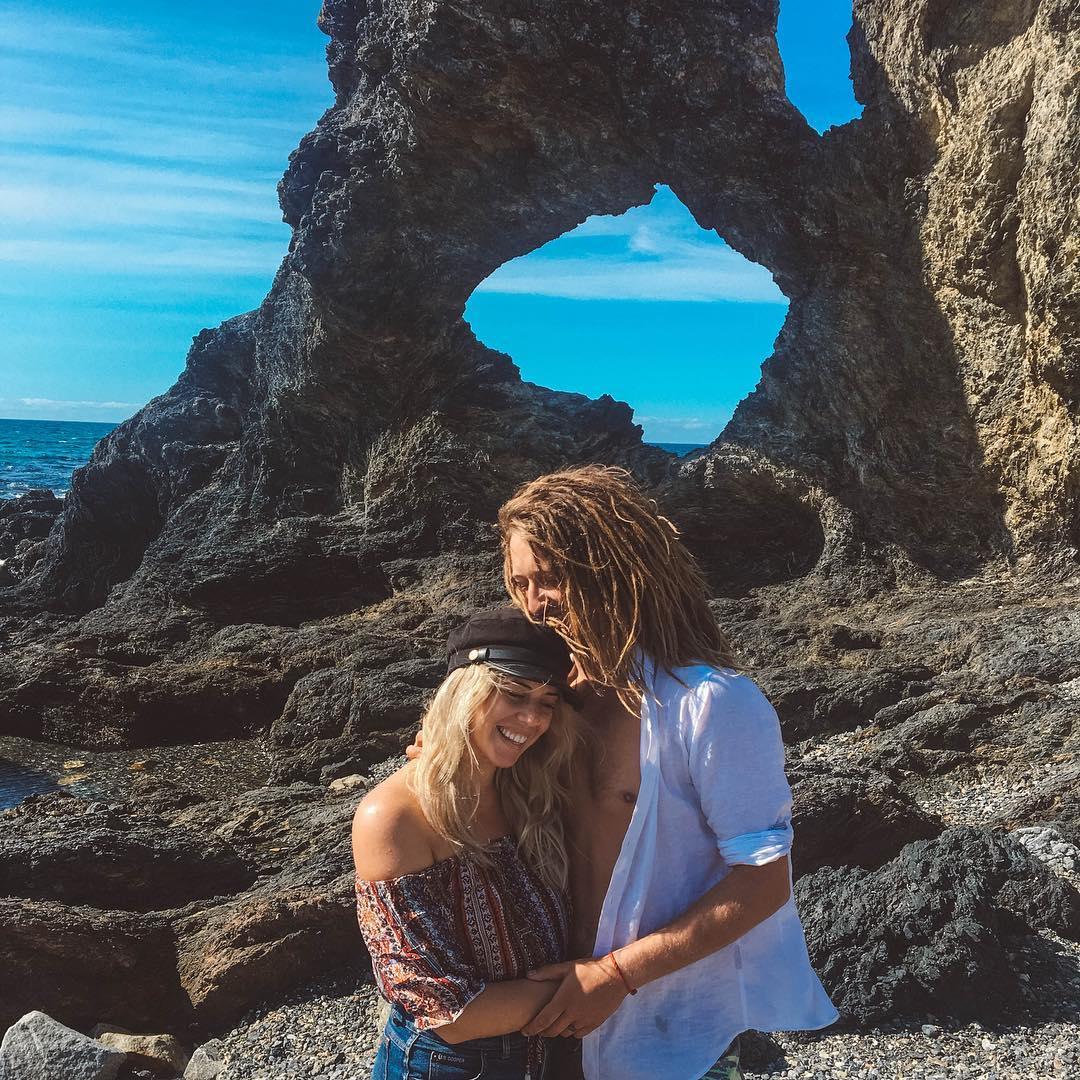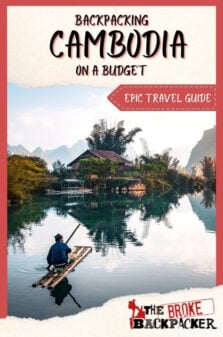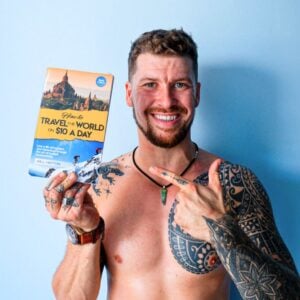Cambodia is a captivating country, rich in culture, history, and architecture.
When backpacking Cambodia you’ll stumble across breathtaking beaches, incredible temples, beautiful islands and delicious Khmer food. It’s a magical land where you can buy a beer for 25 cents, a bed for a dollar and a tasty restaurant meal for just a couple of bucks.
Many people backpack Cambodia to see the miraculous Angkor Wat, the largest religious monument in the world, but Cambodia is more than just temples, beaches, cheap food, parties, and alcohol. The country has a dark past, with 1.5 – 3 million people killed in the Khmer Rouge, led by tyrant Pol Pot. It happened only 35 – 40 years ago and is still very fresh and raw to the Cambodian people.
Despite the tragic history, the local Khmer people are some of the kindest humans in the world. The country is still recuperating, rebuilding, and moving forward; however, corruption is hindering its rehabilitation. It’s one of my favourite Southeast Asian destinations; I loved it so much that I ended up overstaying my visa. Cambodia seriously has it all, see it for yourself & you’ll fall in love too.
With this travel guide for Cambodia in hand, you’ll have everything that you’ll need to experience this amazing country. You’ll know what to do, where to go, and where stay in Cambodia after reading this guide. Listen well, broke backpackers, and you’re sure to have a good time here!
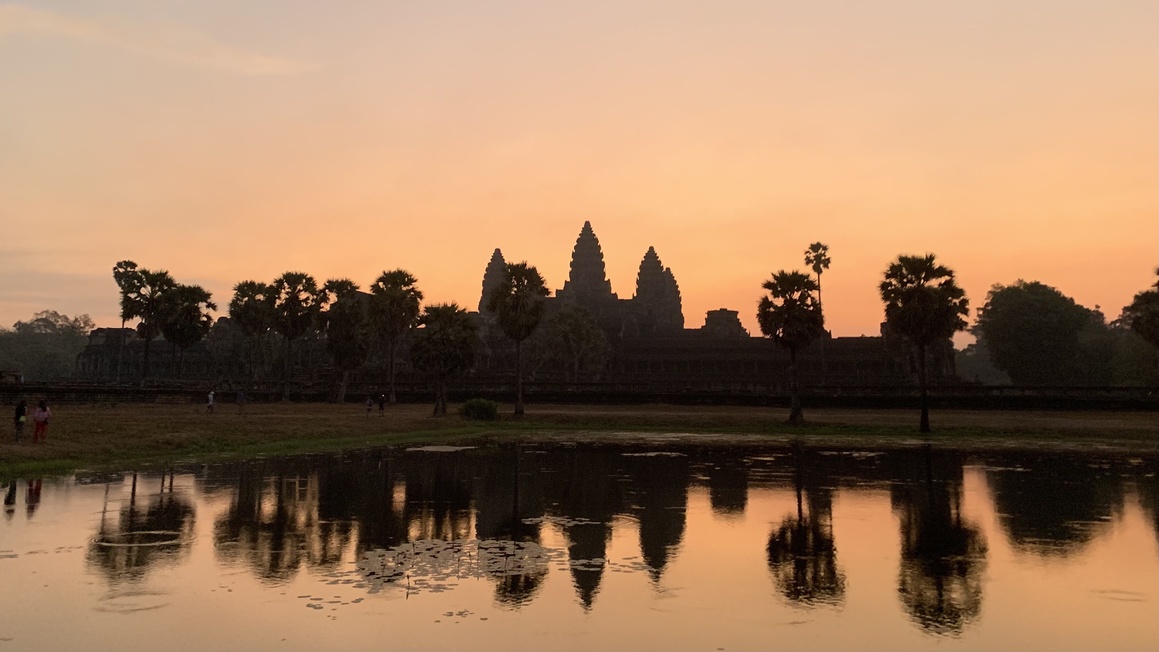
Photo: @joemiddlehurst
Why Go Backpacking in Cambodia?
Filled with many vibrant areas and places to stay, Cambodia is an incredibly diverse country for its landmass. Absolute highlights include the world wonder, Angkor Wat, island hopping around Koh Rong, and exploring Cambodia’s cities on two wheels. Make sure to get out in the countryside to get a taste of the local, rural life!
We’ve included a couple off the beaten path destinations, small villages, and remote hikes in our guide! Read on!
- Best Travel Itineraries for Backpacking Cambodia
- Places to Visit in Cambodia
- Top Things to Do in Cambodia
- Backpacker Accommodation in Cambodia
- Cambodia Backpacking Costs
- Best Time to Travel to Cambodia
- Staying Safe in Cambodia
- How to Get Into Cambodia
- How to Get Around Cambodia
- Working in Cambodia
- What to Eat in Cambodia
- Cambodian Culture
- Some Unique Experiences in Cambodia
- Final Advice Before Visiting Cambodia
Best Travel Itineraries for Backpacking Cambodia
The itinerary below depicts some of the best spots that you can explore whilst backpacking Cambodia. If you want to save time and accommodation, I’d recommend getting a night bus to travel long distances, like Sihanoukville to Siem Reap.
There are a lot of backpacker routes, which typically include Siem Reap, Phnom Penh, Sihanoukville, and Kampot. However, there are many more awesome places to check out when backpacking Cambodia.
Follow our Cambodia travel guide to find these secret hidden gems!
Backpacking Cambodia 3-Week Itinerary: The Highlights
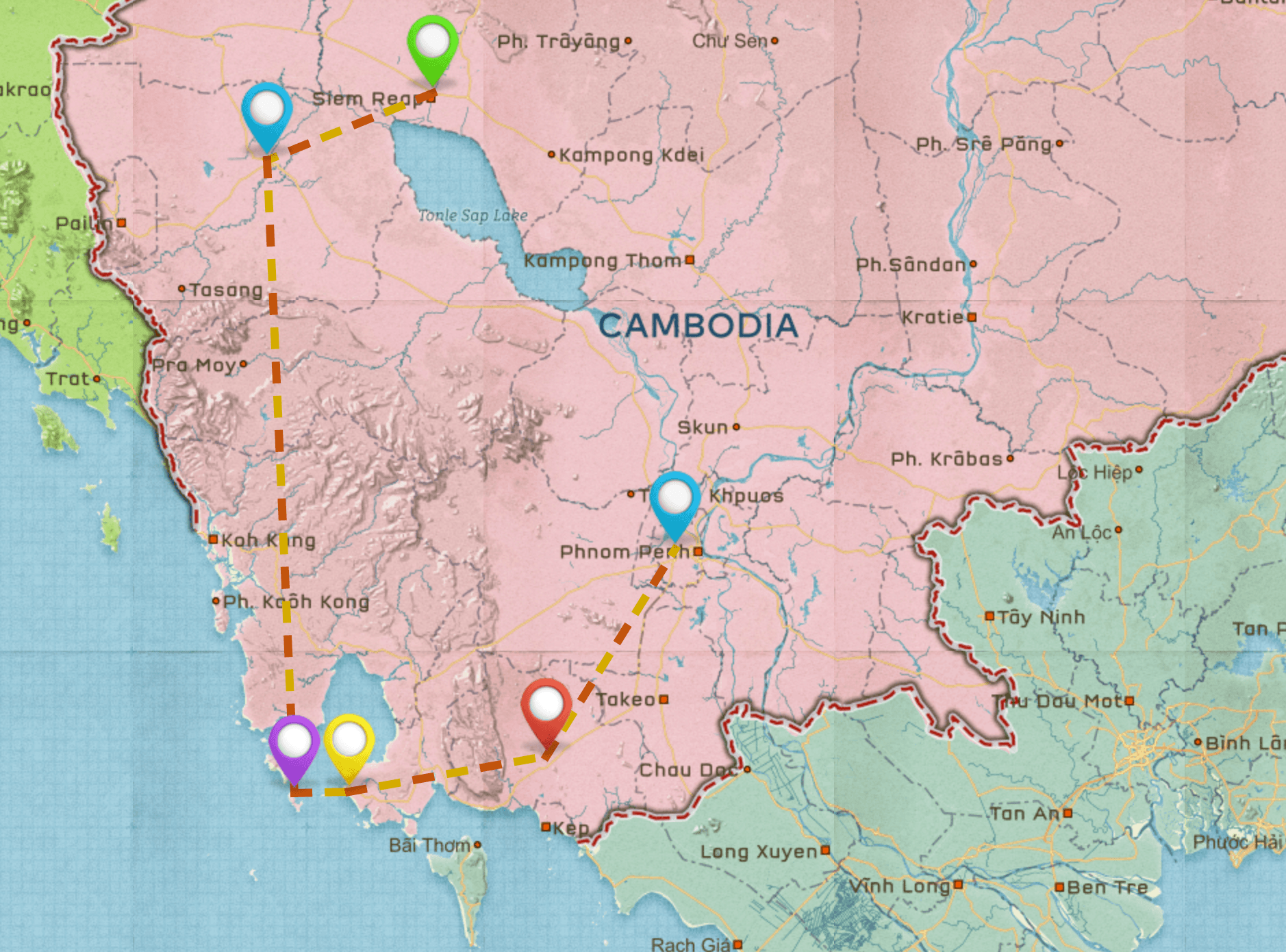
This itinerary will cover Cambodia’s most popular destinations, as well as a few of my favourite hidden gems. It is possible to complete this backpacker route in either direction! Many people start in Phnom Penh or Siem Reap depending on their flight.
You can also combine this itinerary with a trip to Vietnam or Thailand!
We’re going to start with a trip to Phnom Penh – the capital city – however, it’s with a bit of a low. If you are going to be backpacking Cambodia, you should know about the dark and turbulent recent history, so visit the S-21 Prison & the Killing Fields while you’re here. You can also shoot an AK47, M16, RPG at a firing range. Not exactly uplifting, but definitely a unique experience.
Afterward, head to Kampot is a quaint riverside town located at the base of the Elephant Mountains. You can explore the town by bicycle, check out the French colonial architecture and indulge in delicious food.
Next, head to the coast and find a place to stay in Sihanoukville. Sihanoukville is a party area and gateway to explore the breathtaking islands. While Koh Rong has become more developed, Koh Rong Samloem remains a laidback getaway.
After some fun in the sun, head to Battambang to get a taste of genuine Cambodian life. Visit the crumbling temples, caves, the bamboo train and quaint little villages. Finally, end your trip in Siem Reap. While touristy, there is plenty to do here, like visiting the legendary Angkor Wat and Banteay Chhmar.
Places to Visit in Cambodia
Below are my favorite destinations in Cambodia, complete with helpful information on what to see, do, and where to stay!
Backpacking Phnom Penh
Phnom Penh is a busy, happening city, home to the spectacular Royal Palace and nestled right on the Mekong River. The city is wonderfully affordable; you can find the cheapest accommodation in the southern and central areas of Phnom Penh.
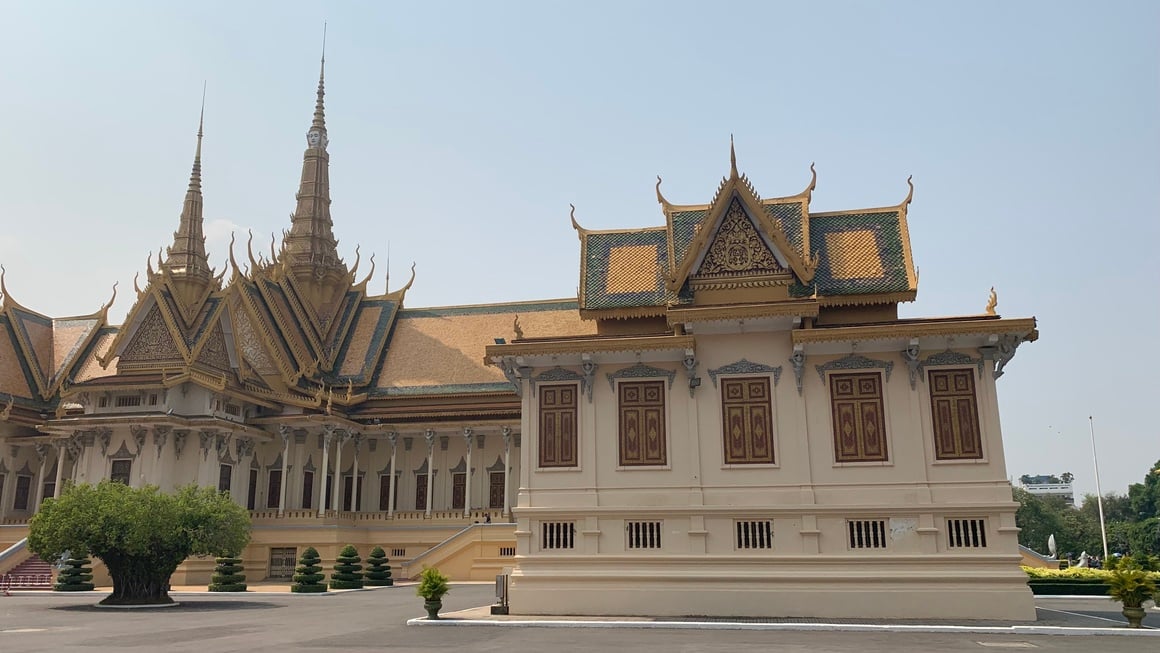
Photo: @joemiddlehurst
The city has risen from the ashes of the Khmer Rouge, led by tyrant Pol Pot. It’s important to visit S-21 Prison and the Killing Fields while you’re in Phnom Penh, to get a proper understanding of the country you are travelling through. For those of you who glimpse the evidence of genocide and mutter “this would never happen back home” it is important to note that both the US and UK governments supported the Khmer Rouge with weapons and supplies in an effort to destabilise neighbouring Vietnam.
Both S-21 Prison & the Killing Fields have a somber feel, be prepared for a unique, heavy and heartbreaking experience and please remember to be respectful! A tuk tuk to the S-21 prison, killing fields and back to the city should cost around $8, which can be split between 4 people.
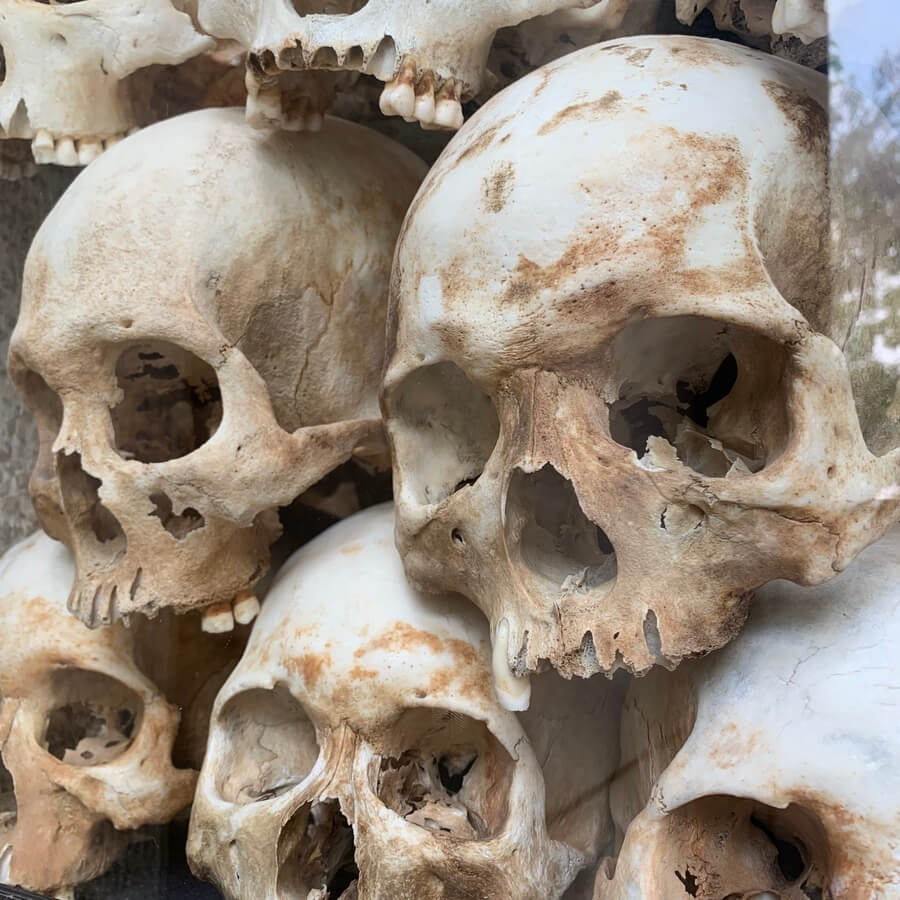
Photo: @joemiddlehurst
It is also worth visiting the National Museum, Independence monument, and the Silver Pagoda if you’re in Phnom Penh whilst backpacking Cambodia. For shopping head to the Central Market to browse (not to buy, prices here are inflated!) and the Russian Market for pirated DVDs, CDs and fake designer clothes.
Whilst in Phnom Penh you can also visit one of the many firings ranges to shoot an AK47, M16, RPG or anything else that takes your fancy. You can shoot heavy machine guns, throw a grenade or blow a target away with a desert eagle; all for a price.
If you’re backpacking Cambodia in November, try to tie in visiting Phnom Penh with the Water Festival. It’s one of the largest festivals in Cambodia and the city comes alive with a carnival atmosphere during this period. It does get busy during this period, however, so make sure that you book a hostel in Phnom Penh in advance.
Backpacking Kampot and Kep
Kampot is a quaint riverside town located at the base of the Elephant Mountains. You can explore the town by bicycle, check out the French colonial architecture and indulge in delicious food. If you love Italian food you need to visit the rustic street food restaurant ‘Ciao’. It’s cheap, authentic and made from scratch!
The sunset cruise is a great way to spend the evening, cruising along the river with the fireflies & watching the sunset. Nearby is the Arcadia waterpark, where you can spend the day getting drunk, sliding into the river, jumping off inflatables and kayaking. Entry is $5 each or free if you stay at Arcadia Hostel.
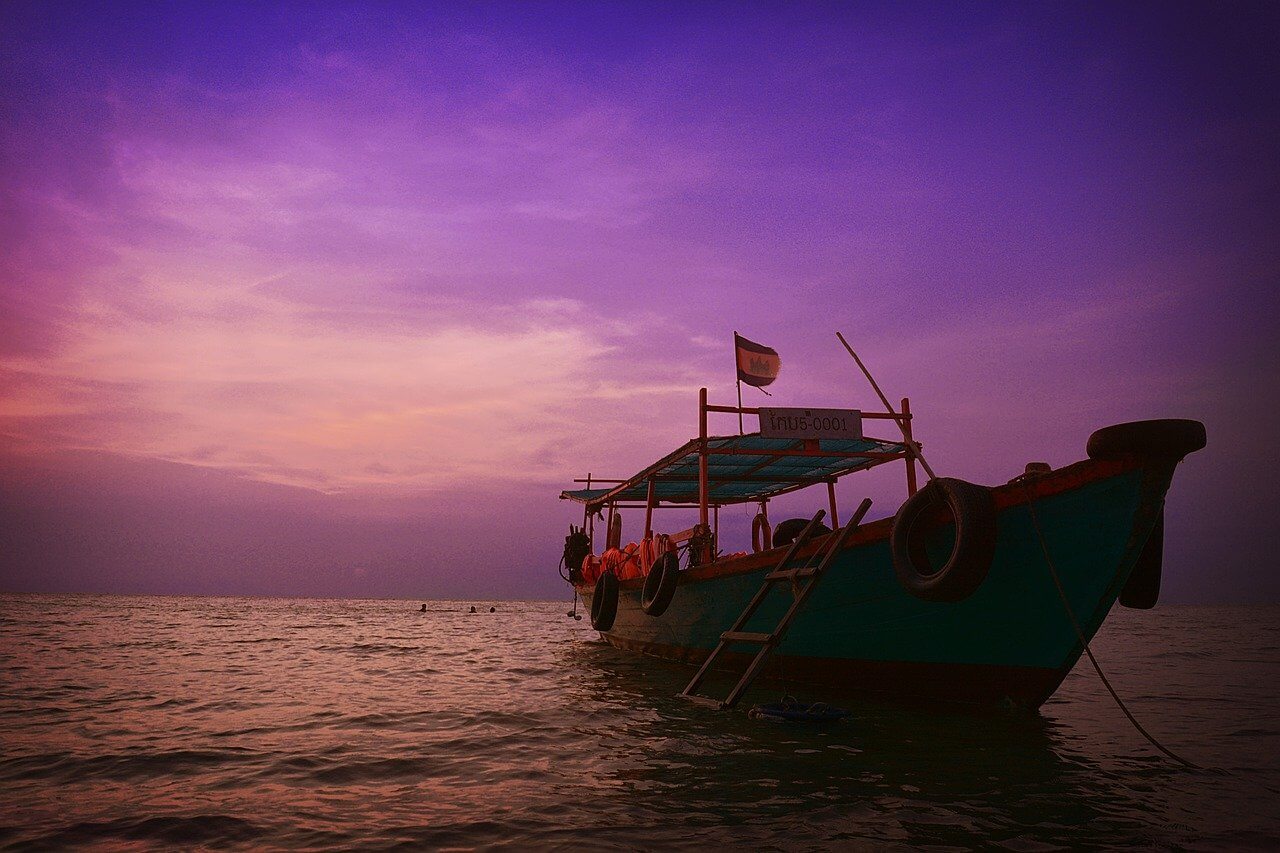
Drive past and stop at the pepper plantations and salt fields before travelling to Kep. It’s a 35-minute drive and you can have a dip in the ocean as soon as you arrive! Kep is home to a beautiful national park with a trek known as the “Stairway to Heaven”. The trail leads to an incredible view and pagoda at the top of the hill.
Backpacking Sihanoukville and Otres Beach
Sihanoukville is a party town and gateway to explore the breathtaking islands when backpacking Cambodia. The coastline is dominated by long stretches of beach and a stunning waterfall nearby. Otres Beach is far south of town and is the main hangout for backpackers who want to relax on the beach during the day and party at night.
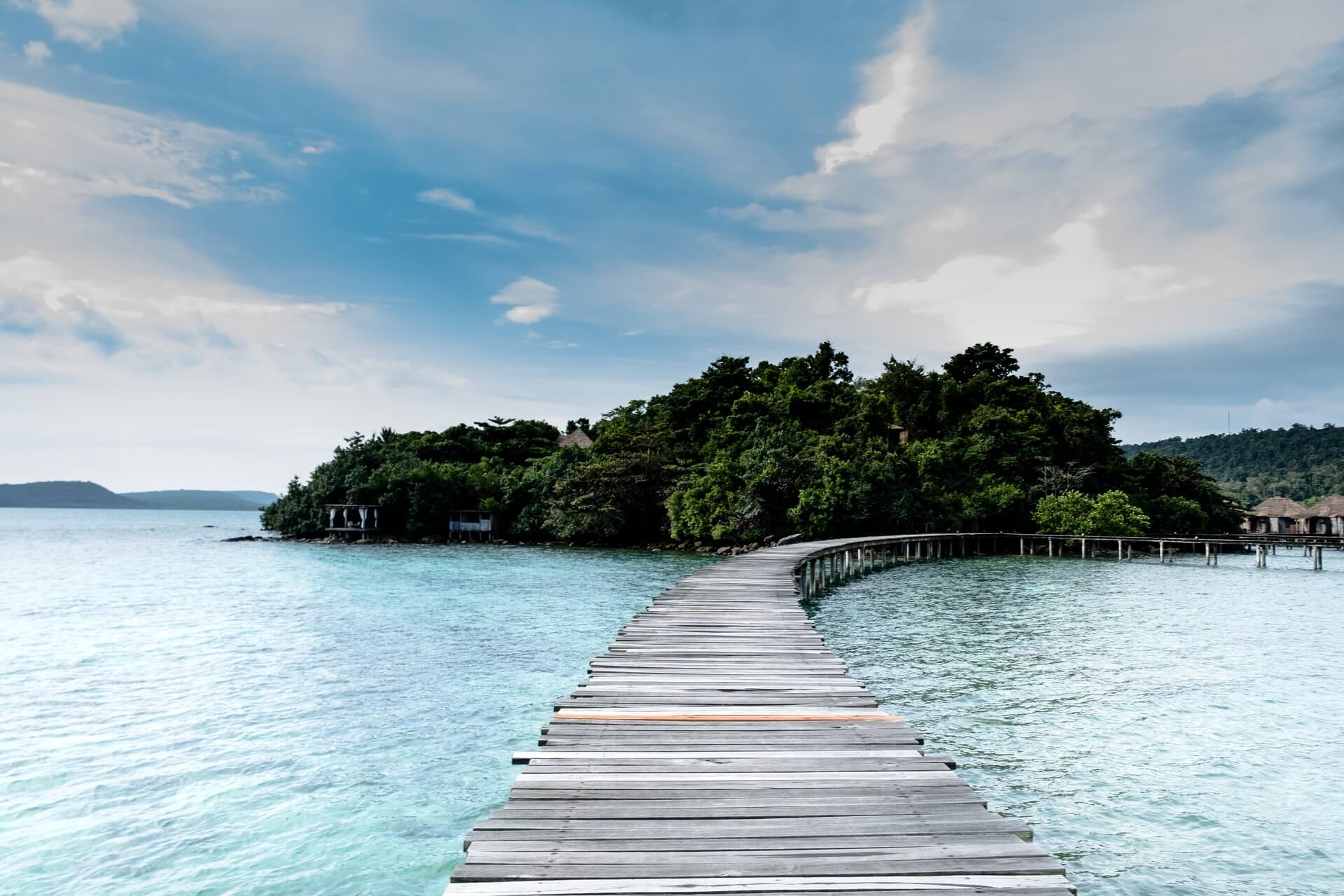
There’s a mixture of cheap bungalows, chill guesthouses, fancy resorts, and funky backpacker hostels in Sihanoukville as well as the Otres area. Otres has a great backpacker vibe, so if you’re sticking around for a few days either before or after visiting the islands, I’d recommend staying around the Otres area.
Backpacking Koh Rong
If you’re looking to find the best parties in Cambodia, then Koh Rong is the place for you. Development of the island has negatively impacted the charm and chilled out vibe of Koh Rong, particularly around the Koh Touch area. Although some parts of the island are extremely touristic, a large area is still covered by dense forest and you can still find secluded laid back spots on the island.
The backpacking scene in Koh Rong is home to the best parties in Cambodia, particularly around Koh Touch. Here you’ll find DJs, live music, BBQs, and one hell of a party. Nights tend to escalate here, next minute you’re 3 buckets deep, skinny dipping in the ocean and have to run back to your hostel half-naked because someone stole your clothes…
That’s a normal night out, so you can only imagine the craziness during the full moon parties. This is a great party area when backpacking Cambodia, however, it’s not the best place on the island to chill during the day.
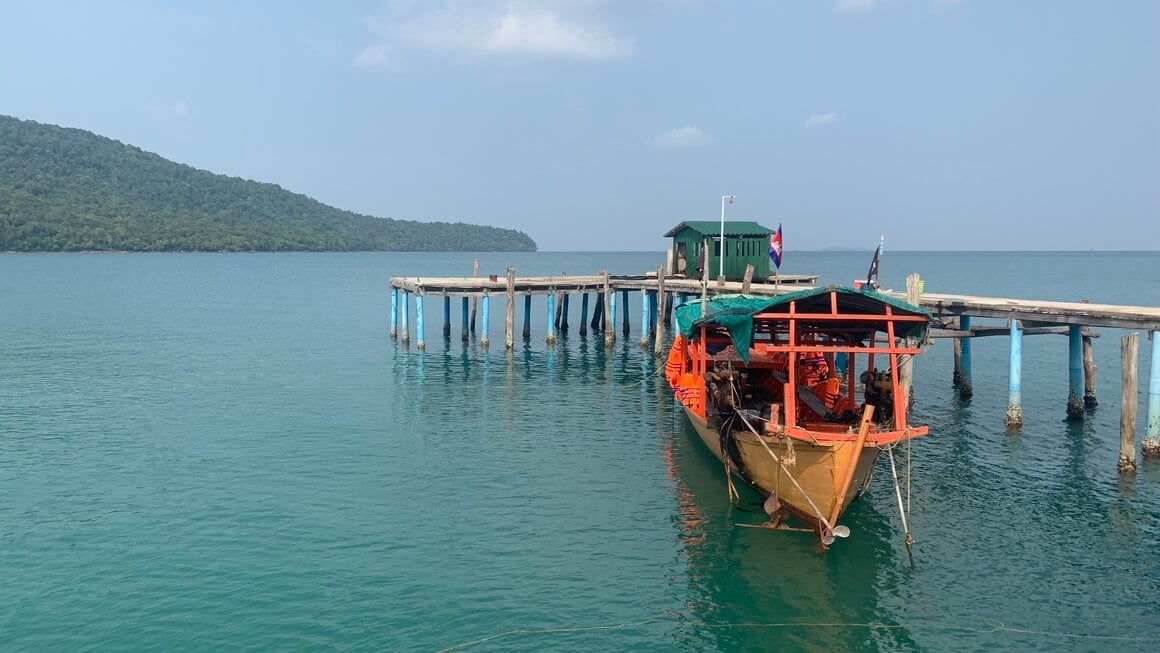
You shouldn’t swim at some beaches, as it’s not safe due to the wastewater being pumped out into the ocean. If you go to the bathroom at a restaurant on some beaches, you can literally see the pipes that run from the restaurant into the ocean. Although more and more guesthouses, hostels, bars and restaurants continue to pop up, they’ve yet to solve the islands waste management.
You can still find laid back and somewhat secluded area’s on Koh Rong, like Sok San Beach, Coconut Beach and Palm Beach. The beaches here are absolutely breathtaking, filled with coral reefs, marine life and the fluorescent plankton at night. It’s a great place to relax, sunbake, snorkel and a poplar dive spot too.
Ferries to Koh Rong run regularly from Sihanoukville and Koh Rong Samloem daily. Make sure you visit an ATM prior to arriving, as there’s no ATMs on the island. If you do get stuck & run out of money, you can borrow money against your passport from Bong’s bar, however you have to pay an extra 10% on top of what you borrowed.
Backpacking Koh Rong Sanloem
Koh Rong Sanloem (or sometimes Koh Rong Samloem) is what Koh Rong was about 10 years ago, before the negative impact of tourism and development. This is the one place I’d recommend everyone go when they travel to Cambodia.
The island is still fairly untouched, with only a few resort options on the island. The majority of the island is covered by dense jungle, so there are no roads and the only option to explore the island is by hiking. You can get a boat to other beaches around the island if you don’t feel like hiking.
Ferries frequently run to Koh Rong Samloem from Sihanoukville and Koh Rong. They drop you off at Saracen Bay, it’s the most touristic part of the island and so I’d recommend leaving there as soon as possible. However, it’s one of the only parts of the island that has Wi-Fi.
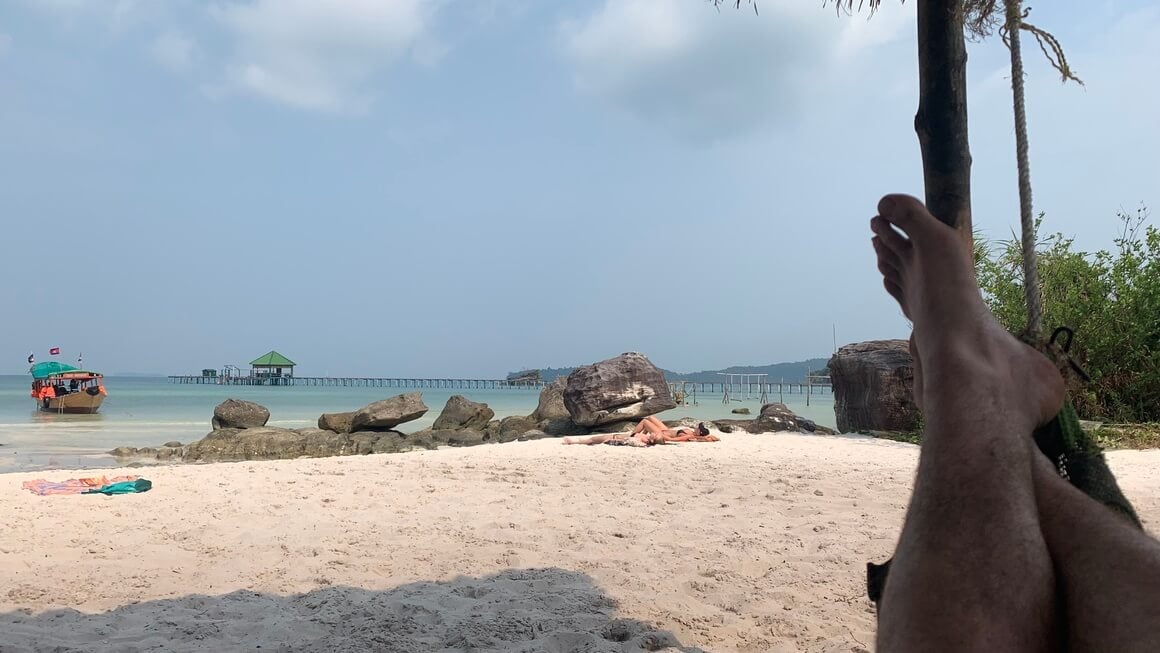
Photo: @joemiddlehurst
Make sure you check out Lazy Beach and Sunset Beach while you’re on the island. They’re two of my favourite spots that make you feel like you’re living totally off the grid, in a tropical paradise. There isn’t much of a social backpacking scene on these parts of the island, so if you’re looking to relax, socialize and party at night, then visit Mad Monkey Hostel. They have a free boat, which coincides with the ferry dropping you off at Saracen Bay.
You can fish, swim, snorkel, island hop, and dive on Koh Rong Samloem. At night be mesmerised by the luminous trails the phytoplankton leave behind. This island is pure bliss and I’d come back in a heartbeat!
Backpacking Battambang
Battambang is an awesome place to visit whilst backpacking Cambodia. You get a true taste of genuine Cambodian life by visiting the crumbling temples, caves, bamboo train, and quaint little villages.
It’s a little bit more touristic than I imagined, however, the countryside is utterly beautiful. This is a great ‘off the beaten path’ destination and it makes sense to head here, hire a motorbike, and then just explore.
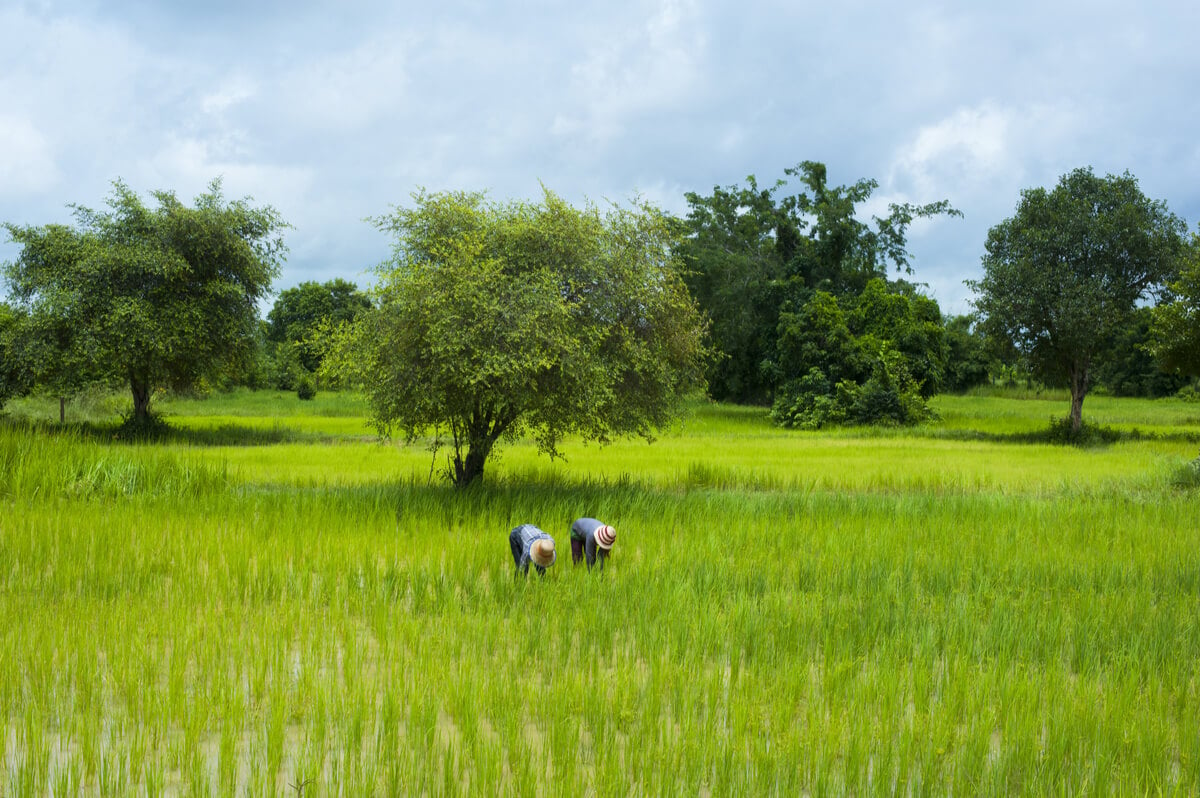
Photo: Stasis Photo
The main attraction here is the bamboo train, which takes you along a railway to a small village. Be aware of the children from the village. You think they’re just being friendly when they tell you information about the place (without asking); they will demand money from you when you leave for their “service”.
Backpacking Siem Reap
If you’re backpacking Cambodia then you’ll most likely be stopping off in Siem Reap, one of the best places to stay in Cambodia. It’s the main tourist destination and is visited by over one million people who’re travelling to Cambodia every year.
Majority of people who travel to Cambodia come to visit the world’s largest religious monument, Angkor Wat dubbed the most incredible man-made piece of architecture. The ruins here are really impressive, however, I personally prefer the temples and atmosphere in Bagan, Myanmar, and Hampi, India.
The entrance fee is very expensive as you pay depending on how many days you want to spend on the site. The ticket price has doubled since the 1st of February 2017 as an effort to deter potential tourists from visiting.
If you’re on a broke backpacker’s budget, I’d recommend skipping Angkor Wat to visit Banteay Chhmar. It’s comparable to Angkor Wat, but without the million tourists. This hidden yet massive temple complex is located just two hours from Siem Reap.
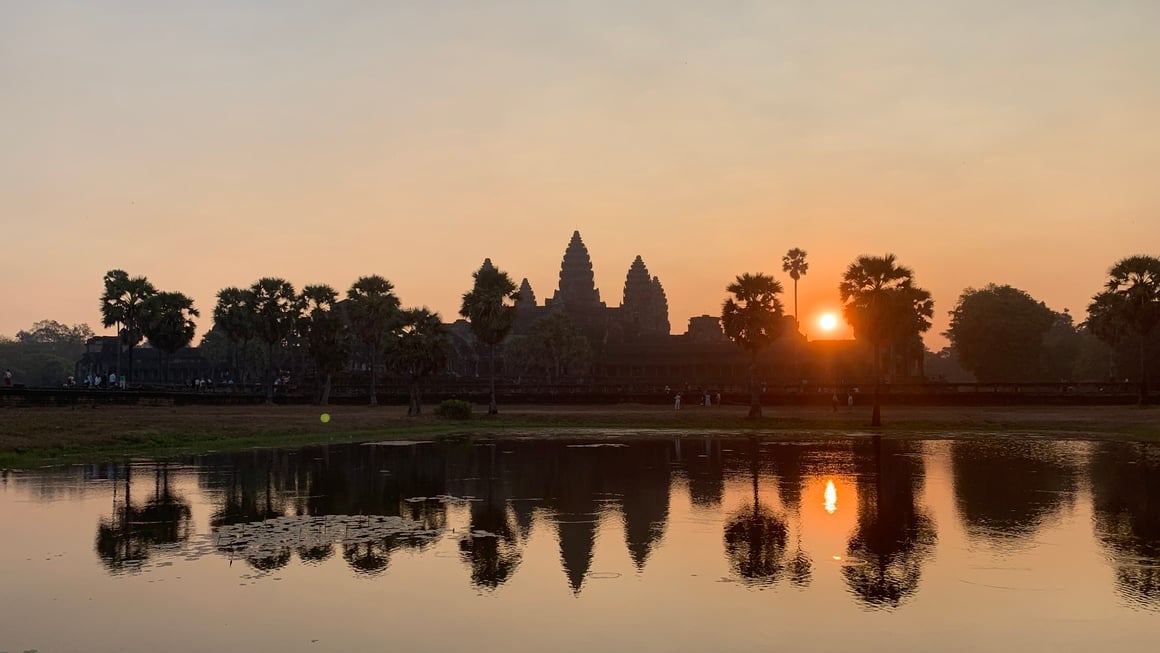
Photo: @joemiddlehurst
If you have your heart set on visiting Angkor Wat, I’d hire a tuk-tuk for the day to explore the massive temple complexes. Nina was recently in Siem Reap exploring Angkor Wat and was shown around by Mr. Phal – A friendly knowledgable guide who made her stay extra special. You can reach him on Whatsapp: +85587854593.
If you have four people in a tuk-tuk then the price is relatively cheap. You can either do the small loop that hit’s all the major sites, like Angkor Wat, Bayon, Ta Prohm and four+ more temples.
The big loop includes the small loop plus six other temples. I did the one-day small loop tour of the Angkor complex, starting at sunrise over Angkor Wat. By the end of the day, I was all temple-d out! It’s absolutely incredible there, however there’s only so many temples you can see in one day.
I highly recommend visiting the Landmine Museum, which makes for a really interesting and rather poignant side trip while you’re in Siem Reap and backpacking Cambodia. There is also a floating village in Siem Reap, however I wouldn’t recommend it.
The stilt huts over the river and crazy floating boat structures are cool, however, there are a lot of scams within the area. A guy tried to con me into paying 80,000 riel to feed the “orphan” children. Instead of giving money, I actually bought them fruit which they threw on the floor in front of me… If you really want to make a difference, pick your battles.
Siem Riep has a truly crazy nightlife and is packed with backpackers looking for a good time, be sure to check out some of the best bars in Siem Riep whilst you’re there. Pub Street is the main place to go out and is packed with bars all in a close proximity.
 Check out Siem Reap’s coolest attractions.
Check out Siem Reap’s coolest attractions.
 Craft the perfect itinerary for Siem Reap.
Craft the perfect itinerary for Siem Reap.
 Read about where to stay in Siem Reap.
Read about where to stay in Siem Reap.
 Book a top hostel in Siem Reap.
Book a top hostel in Siem Reap.
Getting Off the Beaten Path in Cambodia
I could have easily spent months backpacking Cambodia; there many things to explore and discover here, hence why I over-stayed my visa by a week. I just didn’t want to leave!
The longest period of time you can stay in Cambodia is 90 days, (120 days for some countries) with a 30-day visa extension. If you have the time to thoroughly backpack Cambodia, I’d definitely explore more of the islands and backpack around the northwest region of Cambodia.
Koh Rong Samloem was by far my highlight of Cambodia. I’ve never seen an island like it! There are no roads anywhere on the island; everything is accessible either by boat or hiking. Only a few places on the island have Wi-Fi, power is limited, and it truly feels like you’re living off the grid. Sure there are a few fancy resorts, but the majority of the island is undeveloped and it boasts some of the best beaches in Cambodia.
The water is crystal clear turquoise blue, and the sand is powdery and white! Koh Rong Samloem is well known for its incredible diving sites and nature. Watch the sun set over the ocean from Sunset Beach and the ocean come alive at night with the bioluminescent plankton. There are no ATM’s at all on the island, so be sure to visit an ATM prior to getting stuck here in paradise.
Kulien Promtep Wildlife Sanctuary is the largest protected area in Cambodia & is home to many critically endangered animals. If you truly want to explore off the beaten path and be among nature then you’ll love this area.
Near the region is one of Cambodia’s best-kept secrets, Bantey Chhmar. It’s comparable to Angkor Wat but without the million tourists, this hidden yet massive temple complex is located just two hours from Siem Reap. Bantey Chhmar is Cambodia’s 4th largest Angkorian temple, but due to its remote location tourism has hardly affected the region.
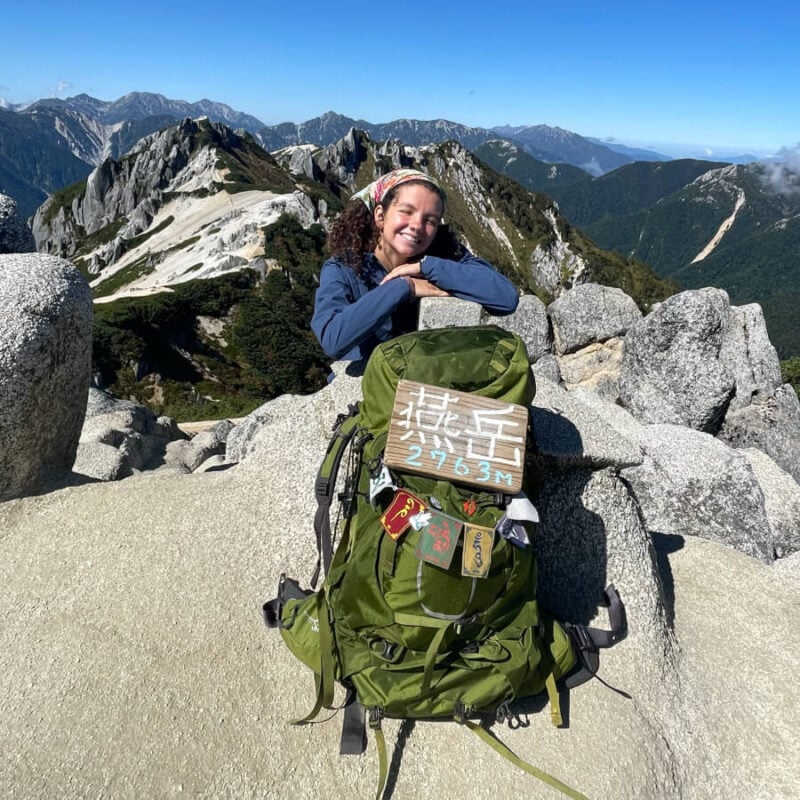
We’ve tested countless backpacks over the years, but there’s one that has always been the best and remains the best buy for adventurers: the broke backpacker-approved Osprey Aether and Ariel series.
Want more deetz on why these packs are so damn perfect? Then read our comprehensive review for the inside scoop!
View on Osprey View on REITop Things to Do in Cambodia
Below is a quick list of the top 6 things you have to do when backpacking Cambodia!
1. Explore the Angor Wat and Banteay Chhmar Temples
Okay, I know I mentioned it’s expensive and crowded, but there is a reason why. This is one of the most impressive temples in the world! As I mentioned earlier, skip the crowds by heading to Banteay Chhmar as well.
2. Beach Bum Koh Rong Samloem
No roads and all beach. This is the island to visit to get away from it all.
3. See Glowing Planktons on Koh Rong
Koh Rong’s beaches light up at night! For a truly exciting experience, try snorkeling amongst the glowing plankton.
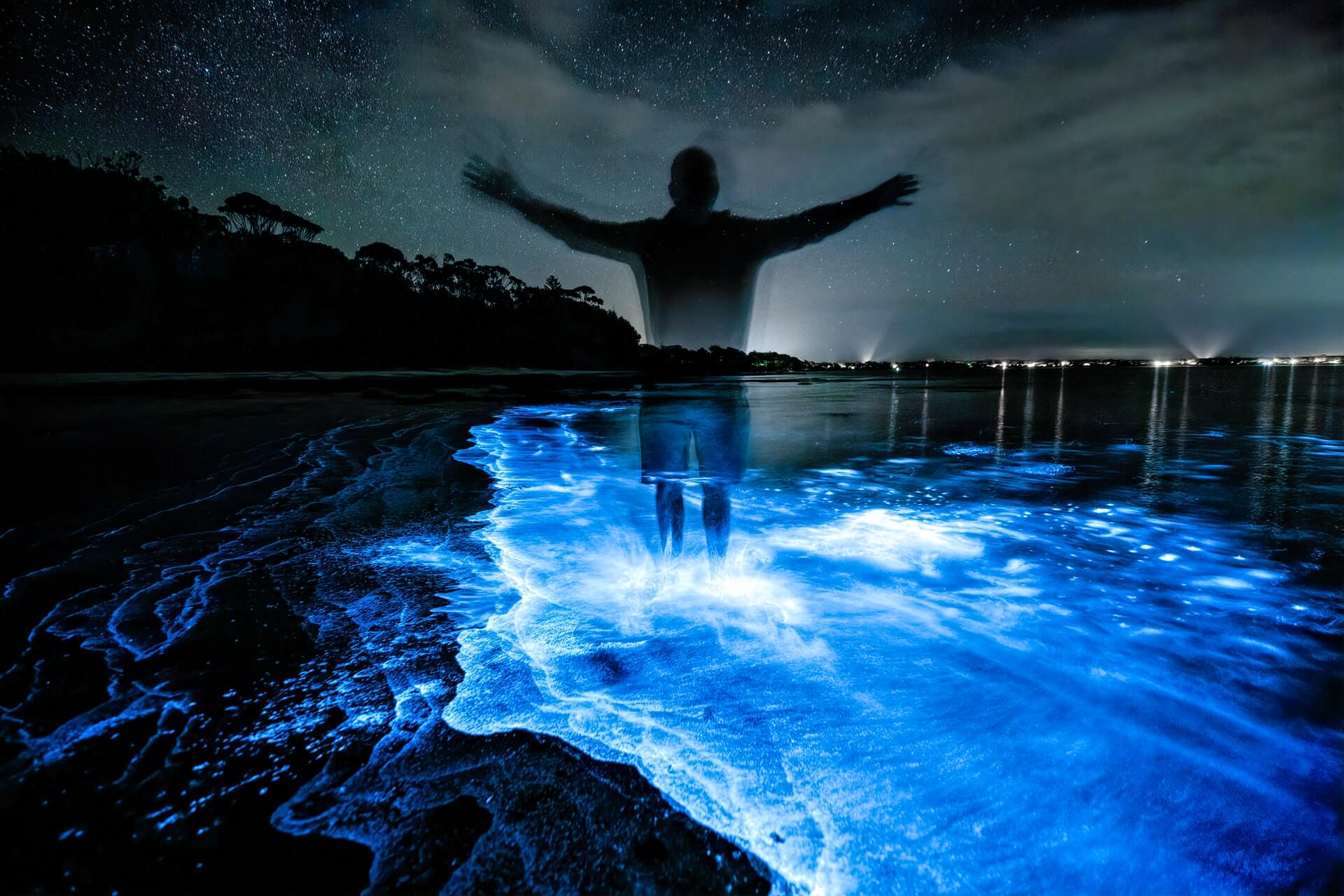
4. Explore the Country by Bike
The trails in Cambodia can be quite challenging, but it’s totally worth it to explore the countryside, escape the crowds, and discover breathtaking waterfalls. As for the cities, Siem Reap and Phnom Penh are ideal to explore on wheels.
5. Bathe Elephants
Make sure to head over to the Mondulkiri Project, 5 hours from Phnom Penh, where you can trek, bathe, and care for the free-roaming elephants. They’re an awesome sanctuary doing good work with their elephants.
Whatever you do, do not support businesses that mistreat the elephants via chains, riding, circus acts, etc. Do your research to ensure you’re not supporting cruelty in the elephant tourism industry.
6. Go on a Yoga Retreat
If you’re a travelling yogi and looking to up your game, check out Blue Indigo Yoga Retreat in Siem Reap – Nina spent a week here getting strong and flexible in Summer 2018 and found it to be an absolutely amazing experience. With great instructors, a challenging but progressive program and cool hangout areas, Blue Indigo yoga courses are fairly priced and well worth dropping in to.
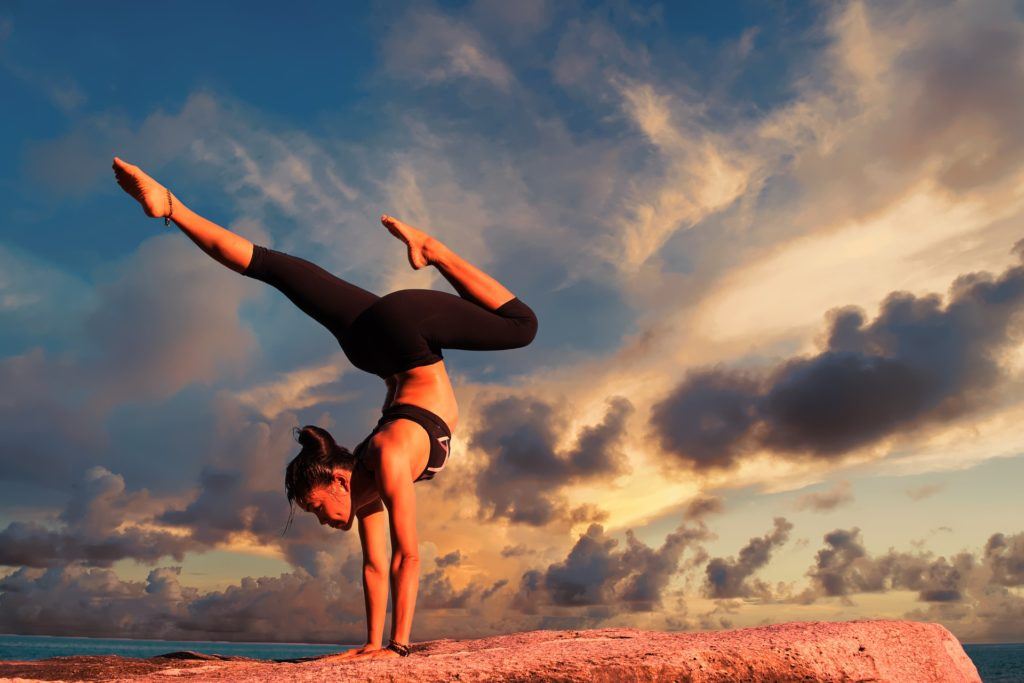
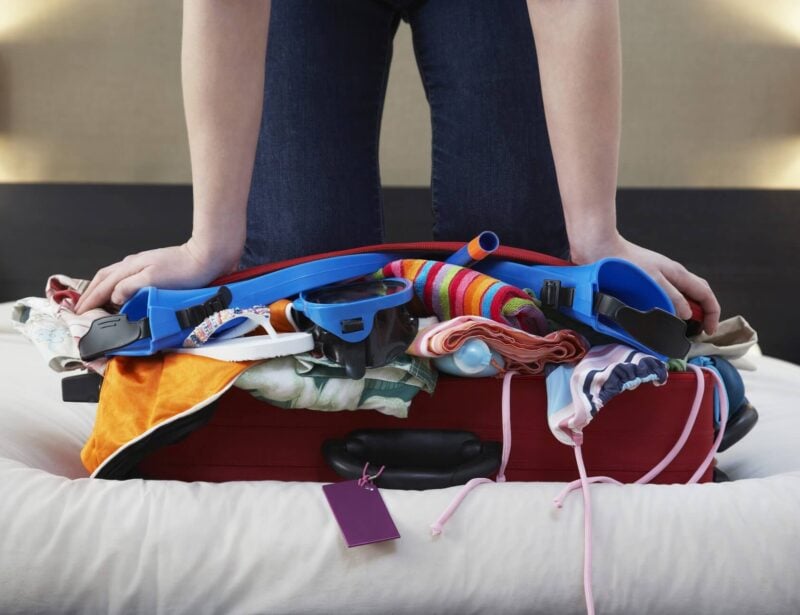
Wanna know how to pack like a pro? Well for a start you need the right gear….
These are packing cubes for the globetrotters and compression sacks for the real adventurers – these babies are a traveller’s best kept secret. They organise yo’ packing and minimise volume too so you can pack MORE.
Or, y’know… you can stick to just chucking it all in your backpack…
Get Yours Here Read Our ReviewBackpacker Accommodation in Cambodia
Cambodia is home to some of the best hostels in Southeast Asia and has a wicked backpacking scene. You’ll have little trouble finding cheap backpacker accommodation in Cambodia. Phnom Penh, Kampot, Sihanoukville, Koh Rong, and Siem Reap have a huge variety of hostels, home stays, and guest houses at an affordable price.
Hostels in Cambodia start from $3 per night and you can snag a private fan room from just $8 for 2 people. If you want to splash out and stay in a hotel room with TV, air con, and attached bathroom, shop around and you can find a place for as little as $15.
Make sure you book ahead if you want to stay at the popular party hostels, especially in peak season. I don’t usually endorse booking ahead really far in advance; however, it is necessary to book a few days prior if you don’t want to be disappointed.
There are a few cool guesthouses around that are cheaper than some hostels in Cambodia. If you’re backpacking Cambodia as a couple, sometimes it’s cheaper to opt for a private room in a guest house opposed to two dorm beds. You can always hang out at the popular hostels during the day & retreat to your guesthouse at night for a quiet sleep.
Below are a few of my favourite hostels & budget accommodation options when backpacking Cambodia.
The Best Places to Stay in Cambodia
| Destination | Why Visit? | Best Hostel | Best Private Stay |
|---|---|---|---|
| Phnom Penh | If you’re into the chaos of cities. The Royal Palace is pretty cool and the killing fields is… well… unforgettable. | Mad Monkey Phnom Penh | La Belle Residence |
| Kampot | Kampot is all about the chill vibez. This riverside town at the base of the Green Elephant Mountains is lovely. | Yellow Star Hostel | Kampot Cabana |
| Sihanoukville | Sihanoukville is defo not what it once was, but is still a popular backpackers stop. Oh, and parties here ain’t bad. | Villa Blue Lagoon | Om Home |
| Koh Rong | Come to Koh Rong for pristine beaches, epic bioluminescent plankton and to party your pains away… all night. | Nest Beach Club | Lonely Beach |
| Koh Rong Samloem | If you want Koh Rong without the overcrowding. This is a quiter island where you can disconnect FULLY from life. | Onederz Koh Rong Samloem | Paradise Villas |
| Siem Reap | Siem Reap is famous for one thing… Angkor Wat and the ancient temples. This cultural gem is 100% worth seeing. | Onederz Siem Reap | Khmer Village Resort |
Cambodia Backpacking Costs
Your budget for backpacking Cambodia depends solely on what type of traveller you are. Are you a flash-packer who needs to stay in the best hostels with air-conditioning and a pool? Or are you a broke backpacker who eats, lives and travels like the locals, is always keen to find the cheapest option possible, and doesn’t mind roughing it a little?
If you’re a broke backpacker like myself and will sleep in a portable hammock over a dorm because it’s cheaper, then you can easily travel with a budget of $20-$25 USD per day, assuming that you stay in cheap accommodation, eat local food and travel cheaply.
Rather than flying internally, take a night bus to your next destination, it saves you paying for a night’s accommodation.
Typically, it can actually be cheaper backpacking Cambodia as a pair. Often a private room in guesthouses can actually be cheaper than two dorm beds in a hostel. I try to stay in a cheap guesthouse close to a hostel and just hang out there for the social scene. I’ve found the portion sizes to be massive in Cambodia, so instead of paying for one meal and wasting food, I opt to share my meal & get a snack later if I’m still hungry.
Avoid the tourist traps! The fancy restaurants, VIP buses, air conditioning rooms and buying souvenirs – it all adds up and can blow out your budget big time if you’re not careful. Angkor Wat’s entrance will probably be your biggest “activity” expense: it’s $37 for a 1-day pass, $62 for 3 days and $72 for a 7-day pass.
If you eat like a local, hitchhike, catch local buses, or pack camping gear for outdoor sleeps, then it is possible to live off $10-$15 USD per day. Cambodia is relatively cheap compared to some South East Asian countries, however, it can get really expensive if you’re not careful and fall into the tourist trap.
A Daily Budget in Cambodia
| Expense | Broke Backpacker | Frugal Traveller | Creature of Comfort |
|---|---|---|---|
| Accommodation | $3-$6 | $7-$14 | $15+ |
| Food | $3-$5 | $6-$10 | $15+ |
| Transport | $2-$5 | $6-$15 | $20+ |
| Nightlife Delights | $1-$5 | $6-$10 | $15+ |
| Activities | $0-$9 | $10-$19 | $20+ |
| Total per day: | $9-$30 | $35-$68 | $85+ |
Money in Cambodia
As of December 2020, the current exchange rate is around 4500 riel per USD, but in reality, the riel is pegged to the US dollar at 4000 riel to $1USD. When changing currency the value of your bill often determines the currency exchange rate you will receive. (e.g. A 50gbp bill is valued higher than 10gbp bill).
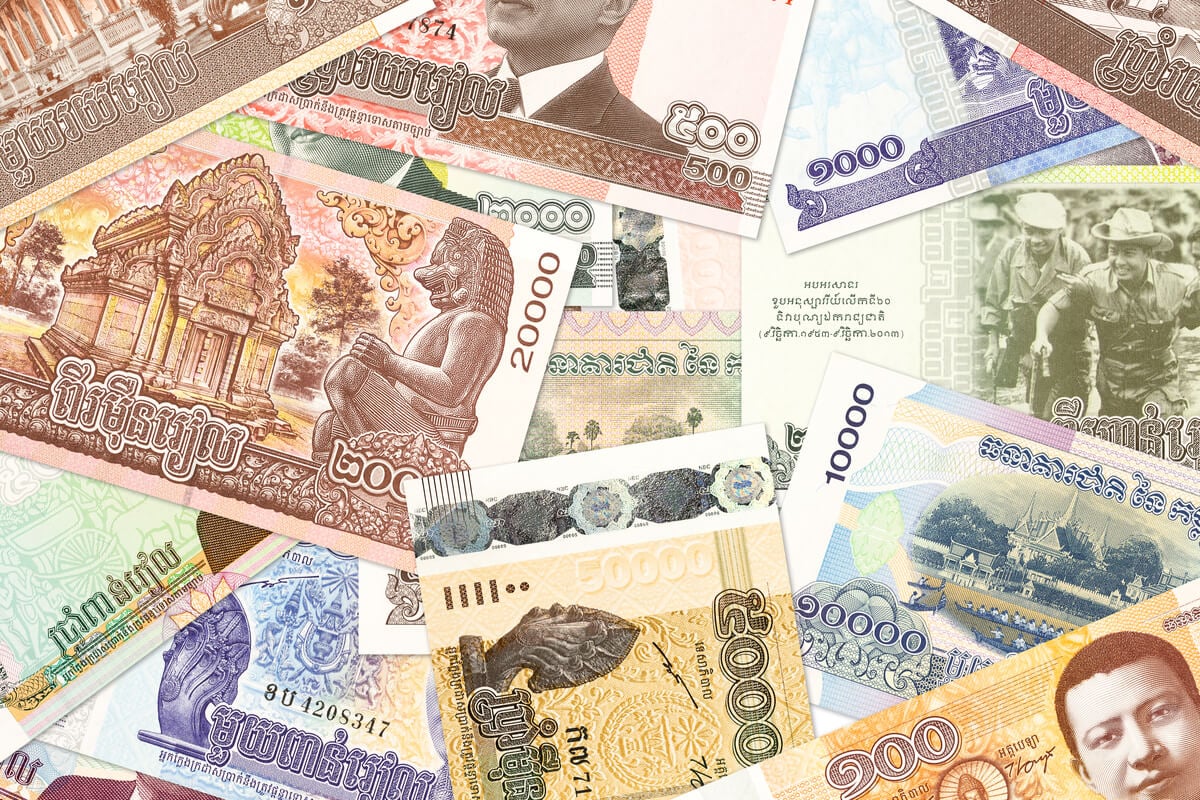
If you want to avoid the ATM fees then I recommend bringing cash instead. US Dollars are commonly used throughout Cambodia and that’s what comes out of the ATM too. If you need change less than $1 they will give it to you in the Cambodian currency: Riel. It’s always handy to have a small amount of Riel on you, especially if you want to pay your tuk tuk driver.
Although it is relatively easy to find ATMs around Cambodia, some remote islands like Koh Rong Samloem and small towns do not have cash machines. Try to get the maximum of cash out allowed in one transaction at the ATM, as fees can be as much as $9 a pop – just make sure you hide your money well!
Travel Tips – Cambodia on a Budget
For a cheap trip, always stick to the basic tenets of budget backpacking and thrifty travelling:
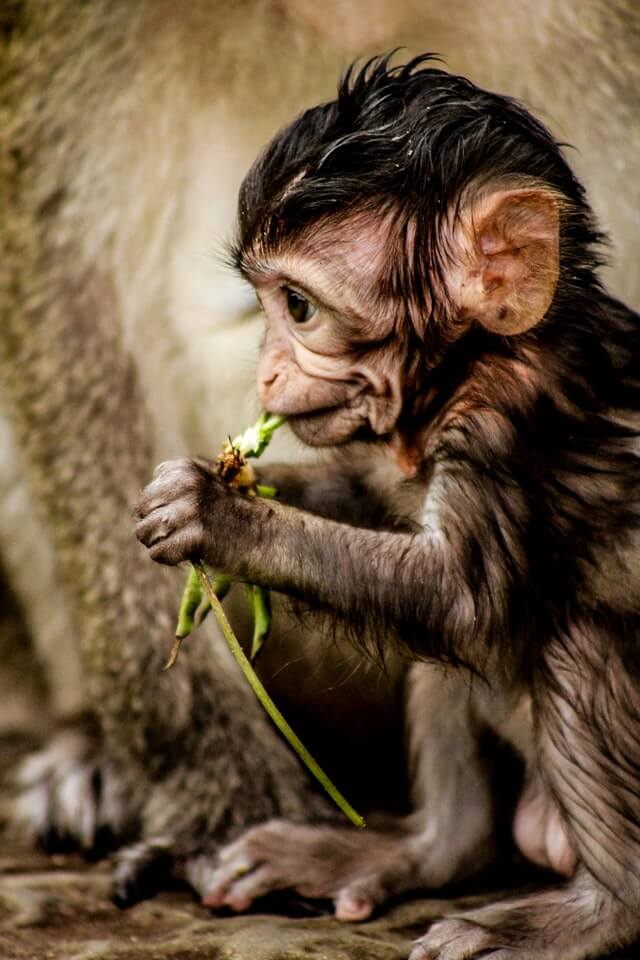
- Hang Your Hammock: My camping hammock saved my backpacking funds big time. Wherever you can find two trees or poles, you can always have a comfortable night’s sleep. Some hostels even let you hang your hammock there (if there’s space) and charge you a quarter the price of a dorm bed.
- Camping: If you got the right backpacking adventure gear, camping on beaches will save you so much money, especially when you’re visiting the islands. Just make sure you don’t set up camp near any resorts or hostels, find a quiet spot and make sure you clean up after yourself.
- Couchsurfing: Travelling through Couchsurfing is a great way to save money on accommodation and get local knowledge. It’s 100% free and you may even end up with a new friend at the end of your stay.
- Eat Local Food: If you eat like a local, then you tend to pay local prices. Sometimes it could be 1,000 riel extra because you’re a foreigner, but it’s still far cheaper than eating at a tourist restaurant.
- Hitchhiking: This is a great way to get around and save a couple of dollars. The experience you get hitchhiking in incomparable to a tourist bus. I’ve been picked up hitchhiking by a local, who just wanted to show me around. He gave me a mini-tour of his hometown the way to our destination and just genuinely wanted me to enjoy my time in Cambodia.
Why You Should Travel to Cambodia with a Water Bottle
Plastic washes up on even the most pristine beaches… so do your part and keep the Big Blue beautiful
You aren’t going to save the world overnight, but you might as well be part of the solution and not the problem. When you travel to some of the world’s most remote places, you come to realise the full extent of the plastic problem. And I hope you become more inspired to continue being a responsible traveller.
Plus, now you won’t be buying overpriced bottles of water from the supermarkets either! Travel with a filtered water bottle instead and never waste a cent nor a turtle’s life again.
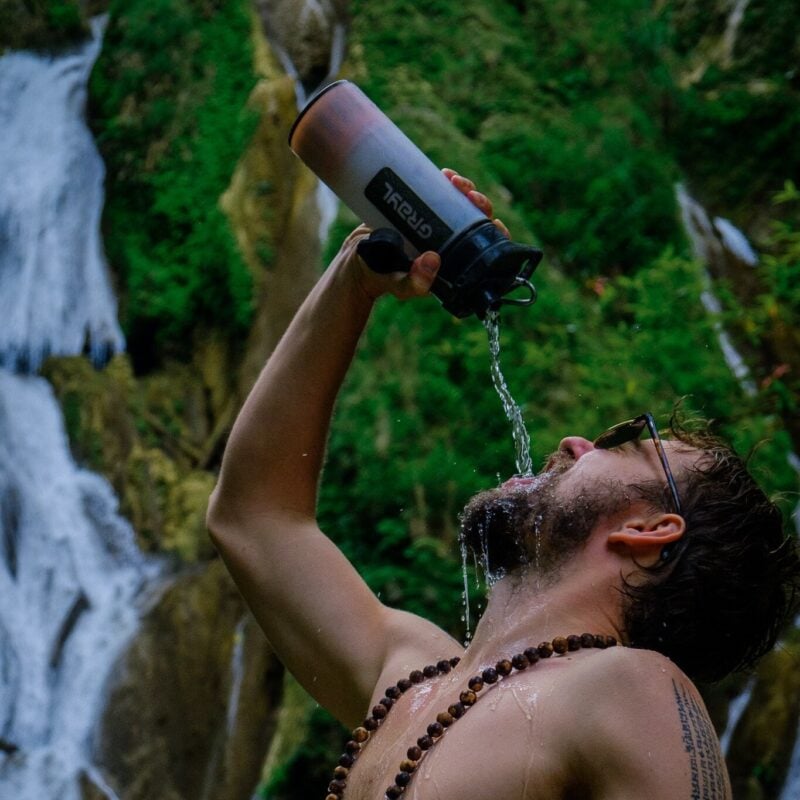
Drink water from ANYWHERE. The Grayl Geopress is the worlds leading filtered water bottle protecting you from all manner of waterborne nasties.
Single-use plastic bottles are a MASSIVE threat to marine life. Be a part of the solution and travel with a filter water bottle. Save money and the environment!
We’ve tested the Geopress rigorously from the icy heights of Pakistan to the tropical jungles of Bali, and can confirm: it’s the best water bottle you’ll ever buy!
View on REI Read the ReviewBest Time to Travel to Cambodia
The best time of the year to backpack Cambodia is in peak season (November-February), known as cool season. The temperature is warm enough to sunbake by the beach, but mild enough to explore Cambodia’s many temples without dying of heat stroke. The prices tend to increase during peak season; however, it’s the most comfortable time of the year to backpack Cambodia.
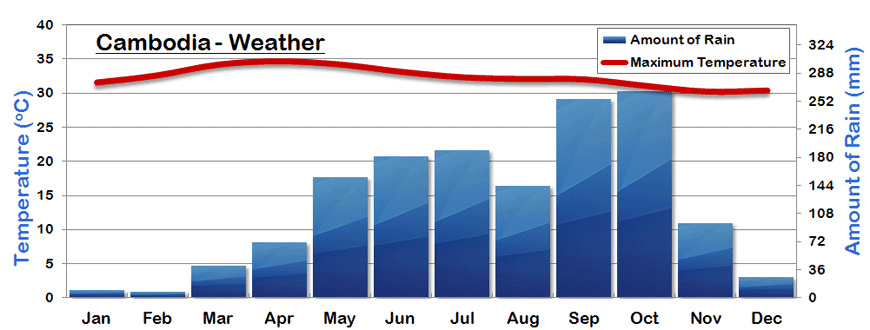
If you’re planning to backpack Cambodia during the wet season (May-September), be prepared for the challenges you face ahead. Cambodia has many dirt roads that quickly turn to mud during the wet season. It can be rather dangerous to drive your motorcycle through the mud as it’s slippery and your bike will have less traction.
It’s also not fun trekking and doing day trips in the wet season. You don’t want the weather to rain on your parade whilst travelling in Cambodia.
During hot season temperatures and humidity rise to an uncomfortable level. Some travellers find the heat unbearable, particularly those from Britain and Scandinavia. I’m quite used to the heat since I’m from Australia but some days even tested my tolerance to the heat. Especially since air conditioning is a luxury when backpacking Cambodia.
Festivals in Cambodia
There are heaps of awesome festivals in Cambodia – both cultual and joyous – but here are a few of my faves:
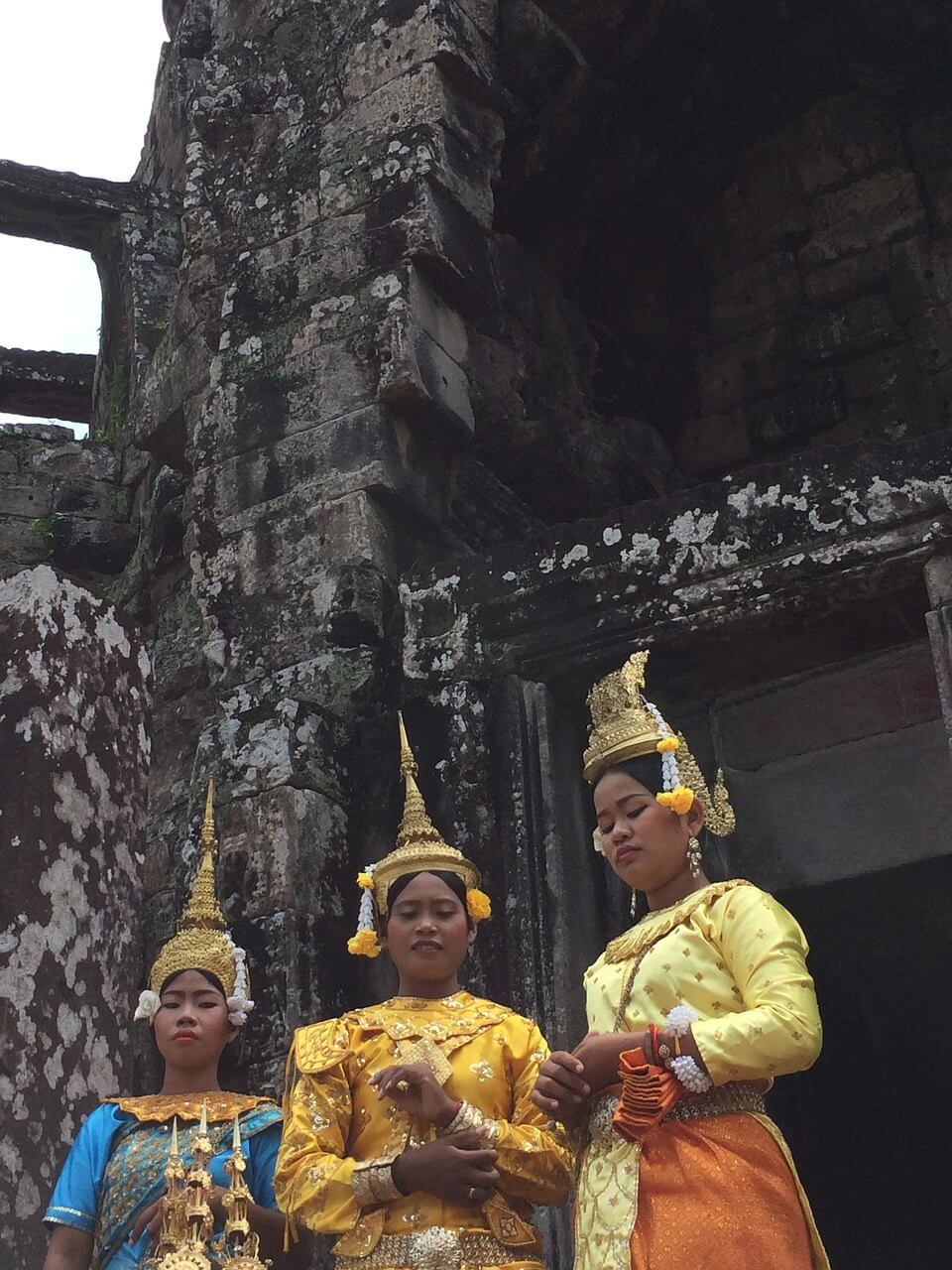
- Chaul Chnam Thmey/Khmer New Year (April) – The whole country stops and everybody parties instead. Three days of festivities, food, temple visits, and a generally crackin’ good time! Come the last day, the water pistols come out for a classic Southeast Asian country-wide water-fight.
- Vesaka Bochea – The celebration of Buddha’s birth, enlightenment, and his transition into Nirvana. This is a massive festival right across Southeast Asia with plenty of temple offerings, lights, and a general air of reverence.
- Pchum Ben/Festival of the Dead (September) – A cultural festival in which Cambodians pay respect to their ancestral dead. Plenty of traditonal rituals mainly at the temples, and the day takes on an extra special significance for the descendants of those killed by the Khmer Rouge.
- Bonn Om Touk/Water Festival (November) – The festival celebrating the natural phenomenon of the flow reversal between the Tonle Sap and the Mekong River. Three days of merriment ensue including music, bands, feasts, fireworks, and boat races galore. Phnom Penh packs out hard, so either get in or get out quick depending on where you want to go in Cambodia for the festival.
What to Pack for Cambodia
For a proper Southeast Asia backpacking experience, it’s important to know what to take there first! On every adventure, there are six things I never go travelling without:
Ear Plugs
Snoring dorm-mates can ruin your nights rest and seriously damage the hostel experience. This is why I always travel with a pack of decent ear plugs.
Hanging Laundry Bag
Trust us, this is an absolute game changer. Super compact, a hanging mesh laundry bag stops your dirty clothes from stinking, you don’t know how much you need one of these… so just get it, thank us later.
Sea To Summit Micro Towel
Hostel towels are scummy and take forever to dry. Microfibre towels dry quickly, are compact, lightweight, and can be used as a blanket or yoga mat if need be.
Monopoly Deal
Forget about Poker! Monopoly Deal is the single best travel card game that we have ever played. Works with 2-5 players and guarantees happy days.
Grayl Geopress Water Bottle
Always travel with a water bottle! They save you money and reduce your plastic footprint on our planet. The Grayl Geopress acts as a purifier AND temperature regulator. Boom!
For plenty more inspiration on what to pack, check out my full backpacking packing list.
Staying Safe in Cambodia
Generally, Cambodia is a very safe place to travel; Cambodians are warm, open, friendly, and appreciative of tourists. You’ve just got to be aware of a few scams here and there. As always, keep your valuables close!
Watch for the tuk-tuk scams! This is when the driver is on a commission to deliver you to a particular shop/temple/restaurant/hotel/bar. You might be pressured to buy/consume/stay, but don’t!
For some more safety tips on travelling Cambodia, I’d recommend checking out our Backpacker Safety 101 post. It’s filled with travel tips and advice to keep you safe anywhere on the planet!
Sex, Drugs, and Rock ‘n’ Roll in Cambodia
The sex scene in Cambodia is on the rise, however, it’s mainly in the Phnom Penh and Sihanoukville area. Some places are quite discreet – so discreet that my friend naively suggested we get a drink “Helicopter Bar” because she liked the name… Little did she know that it was a go-go bar filled with prostitutes.
Drugs in Cambodia are readily available and effortless to find. Weed and opiates are quite easy to come across, are generally offered to you from tuk-tuk drivers. “Happy” pizza places are sprawled all over Cambodia, selling “happy” lassies and “happy” pizzas at a really reasonable price. In general, good marijuana is extremely easy to find and is also quite cheap compared to other Southeast Asian countries.
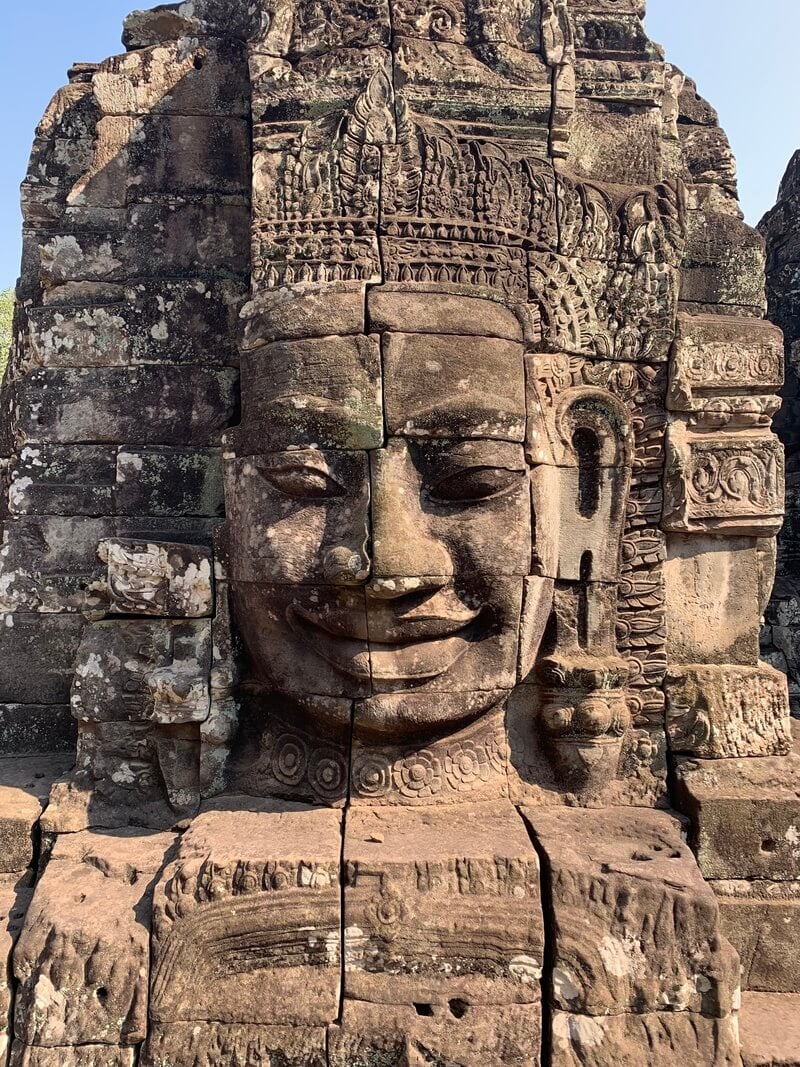
Photo: @joemiddlehurst
It’s surprisingly common to be offered opiates like heroin and pure opium whilst backpacking Cambodia. However, they’re dangerous and many tourists have died whilst taking heroin, mistaking it for cocaine. I’d avoid taking any form of cocaine, speed or ecstasy while travelling Cambodia. It’s not worth the risk and chances are you’re probably getting heroin.
Acid is quite easily available on the islands and Sihanoukville/Otres area. Quite often, they drop the acid on an Oreo or strawberry and it’s typically sold in drops, rather than tabs. Magic mushrooms are also around, however they’re rather expensive to come across.
By far the most commonly used drugs for travellers backpacking Cambodia is pharmaceuticals. You can buy ketamine over the counter if you’re a local, but it’s illegal for foreigners. Valium is a cheap, common drug among travellers backpacking Cambodia. Travellers wanting a similar effect of speed purchase Ritalin over the counter from dodgy pharmacies.
Be careful before diving into the pharmaceutical scene, it can be very dangerous and easy to turn your recreational use into an addiction due to its ease of access. Don’t carry any form of drugs on you. Otherwise, you could end up broke trying to bribe your way out of prison. Check out Blazed Backpackers 101 for tips on how to stay safe whilst partying while travelling.
Travel Insurance for Cambodia
Traveling without insurance would be risky so do consider getting good backpacker insurance sorted before you head off on an adventure.
ALWAYS sort out your backpacker insurance before your trip. There’s plenty to choose from in that department, but a good place to start is Safety Wing.
They offer month-to-month payments, no lock-in contracts, and require absolutely no itineraries: that’s the exact kind of insurance long-term travellers and digital nomads need.
SafetyWing is cheap, easy, and admin-free: just sign up lickety-split so you can get back to it!
Click the button below to learn more about SafetyWing’s setup or read our insider review for the full tasty scoop.
How to Get Into Cambodia
If you are flying into Cambodia, you can arrive at either the Phnom Penh, Sihanoukville, or Siem Reap airport. Otherwise, for those already backpacking around Southeast Asia and crossing by land…
Veun Kham/Dom Kralor is the only option to travel from Laos to Cambodia. Evidently, it’s quite a popular border crossing for backpackers who travel to Cambodia. There are signs and people to direct you where to go so crossing into Cambodia is super simple.
Bavet/Moc Bai is undeniably the most frequently used crossing to travel from Vietnam to Cambodia via land. It was the first crossing to open up for foreign travellers, and it is popular when travelling from Ho Chi Minh (Saigon) to Phnom Penh. The border gate is open from 8 am to 8 pm every day & is easy to navigate.
If you’re going to travel to Cambodia from Vietnam via the Mekong River, then Kaam Samnor/Ving Xuong is your only option. I took the slow boat from Chau Doc to the border, then a minivan to Phnom Penh. You can also get a fast boat along the Mekong River to Phnom Penh, however, it’s much more expensive.
You arrive at the border by boat, they collect your passport/visa, money & then they head to the immigration office to do all the paperwork for you. If you really want, you can go with them, but it’s not necessary. The only part you have to be present for is when they stamp your passport and cross-check your identity. This crossing seems kind of dodgy as there are no signs and only dirt roads; however, we managed to get across just fine, it’s all part of the experience when you’re backpacking Cambodia.
There are two main border crossing for travellers coming from Thailand to Cambodia:
- Aranyaprathet/Poipet is definitely the craziest border crossing when you travel to Cambodia from Thailand, as it’s the closest border crossing to Siem Reap & Bangkok. In peak periods crossing times can be in excess of 3 hours, depending on popularity. If you want to avoid the long lines and wait times, you can opt for an e-visa online, however, it’s a tad more expensive than on arrival.
- Hat Lek/Ko Kong is the most convenient crossing if you’re heading to Sihanoukville in Cambodia from the Kho Chang region in Thailand but (but last I checked) you can’t enter using an e-visa at this border. Be wary of scams at this crossing and Poipet, there have been numerous reports of Cambodian officials asking for absurd amounts of money for visa’s on arrival. Look into getting a Cambodian e-visa if you want to avoid the risk of getting ripped off, but remember to check valid entry points. These problems do not generally exist with arrival into airports. To get a tuk-tuk from the Cambodian border to Kho Khong should cost between 92,000- 120,00 Cambodian riel.
Entry Requirements for Cambodia
To backpack Cambodia, you need a passport that’s valid for at least six months. Over one hundred and fifty nationalities can apply for the Cambodia e-visa online through their website. If you like to plan ahead and not deal with the stress of getting a visa on arrival at the border, then an e-visa is perfect for you. Note though, it can take at least 3 days to process the application so applying the night before entry is not an option, also the e-visa can only be used at certain ports of entry into Cambodia.
Your e-visa will give you 3 months (starting from the date of issue) to enter Cambodia and allows you to stay for up to 30 days, with the option of extending your visa. It’s slightly more expensive than a visa on arrival costing you $37 USD opposed to $35 USD. However, we have recent reports (May 2017) that officials are charging $37 USD for Visa on Arrival as well, so be prepared for that.
If you are crossing from Thailand the situation is similar as with crossing into Laos; you will pay more if you buy your Visa on Arrival in Thai Baht (rate seems to be about 1600 Baht, approx. $48USD) rather than US dollars. Usually, you can find someone running a side business exchanging USD, competition generally dictates the exchange rate. You’re allowed one 30-day visa extension without leaving Cambodia which sets you back $45 USD.
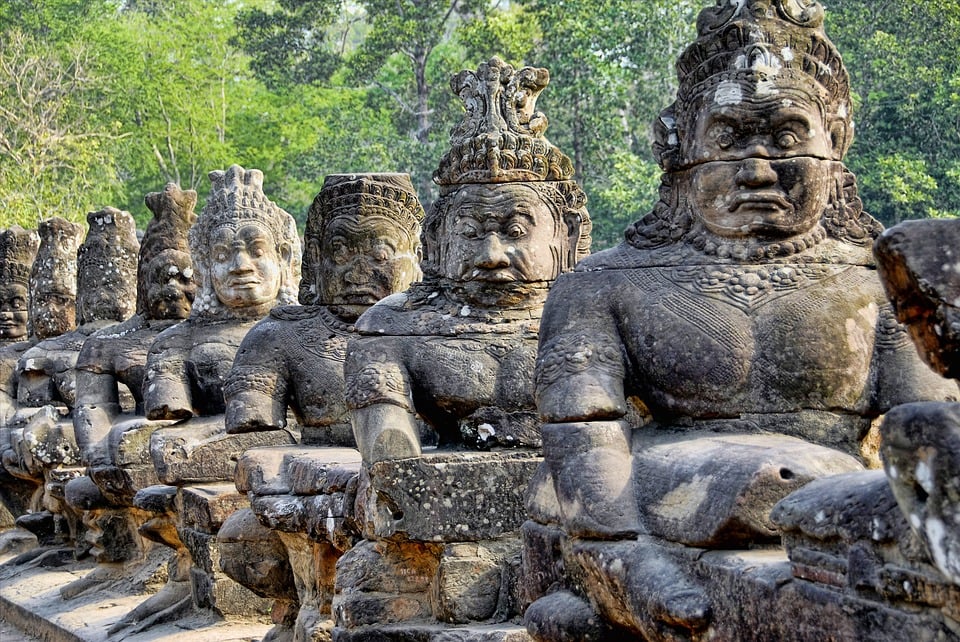
If you do plan to get your visa on arrival when you travel to Cambodia, make sure you bring 2x passport sized photos. You can get your passport-sized photos taken at the border; however, you leave yourself open to paying what ever price is set by officials. Be sure to bring US dollars with you when entering Cambodia, the exchange rates for other currencies are vastly undervalued and you end up paying more than the actual conversion rate.
If you’re pressed for time or need a visa in advance check out iVisa, Ive used them on multiple occasions for sorting my visas.
It isn’t a big deal to overstay your visa in Cambodia, however, it does get expensive quickly. The fine for overstaying is $20 USD per day. So for instance, if you overstay 5 days you will be required to pay $100 USD upon exiting.
Passport holders from ASEAN member countries do not require a visa to visit Cambodia.
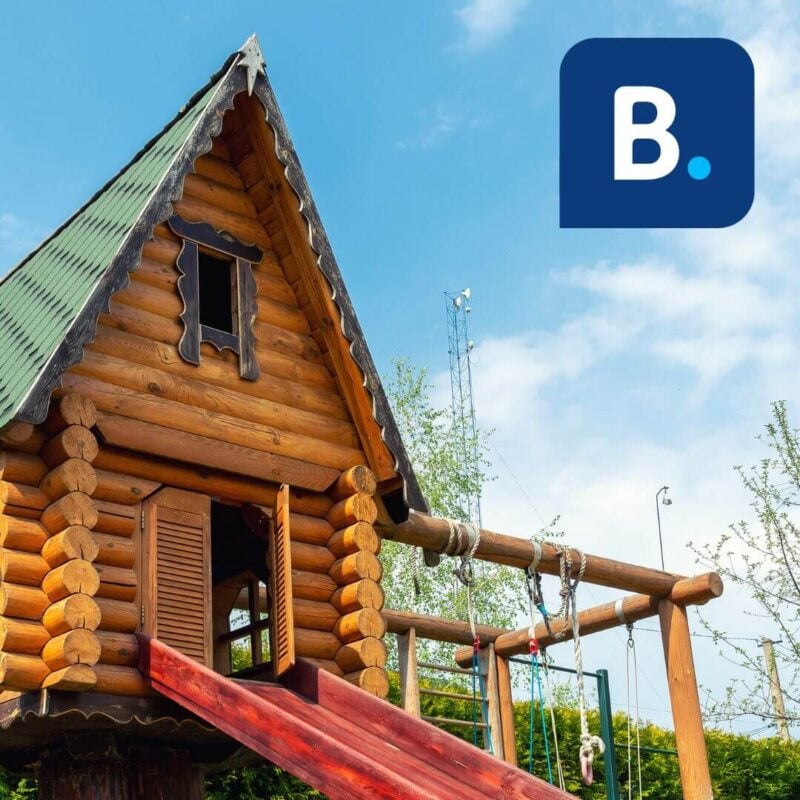
Get 15% OFF when you book through our link — and support the site you love so dearly 😉
Booking.com is quickly becoming our go-to for accommodation. From cheap hostels to stylish homestays and nice hotels, they’ve got it all!
View on Booking.comHow to Get Around Cambodia
Backpacking Cambodia is one crazy adventure and getting around is surprisingly easy and inexpensive. There has been a massive improvement in regards to roads and infrastructure, with the refurbishment of the National Highway. Unfortunately, not all roads have had the same improvements, as there are still many narrow, bumpy & dirt roads around.
The best way to explore whilst travelling Cambodia is undoubtedly by motorbike. If you’re coming by motorbike from Vietnam into Cambodia, you can enter and drive in the country without needing any special permits. Just be sure to have your blue card to prove ownership of the motorbike, drivers license and preferably an international drivers license also.
These are an easy and inexpensive way to backpack Cambodia if you’re travelling for less than 5 hours. I took a 2-hour minibus from Kampot to Sihanoukville which was $7 (USD).
Another great option to go long distances when you’re travelling Cambodia. It’s always worthwhile paying the extra couple of dollars for your sleeper bus. The cheaper buses do get you from A to B, however, they stop multiple times along the way and are not always the cleanest nor comfiest. I opted to stinge out on paying more and ended up sharing my seat with cockroaches… If you’re willing to pay extra you will have your own bed, curtain, power point, and Wi-Fi on your sleeper bus.
Travelling by Motorbike in Cambodia
If you want to see what other travellers who backpack Cambodia don’t, then travel by motorcycle. It’s the best and cheapest way to explore Cambodia, just as long as you have a reliable motorbike. In recent years, the main roads and highways have drastically improved making your drive a lot easier. If you plan to head to Vietnam throughout your travels in Southeast Asia and Cambodia, I’d recommend buying a motorbike there.
If you want to save on accommodation, consider buying a motorcycle tent for your adventure as well. You could pack a regular tent but it’s better to cover your bike up with you.
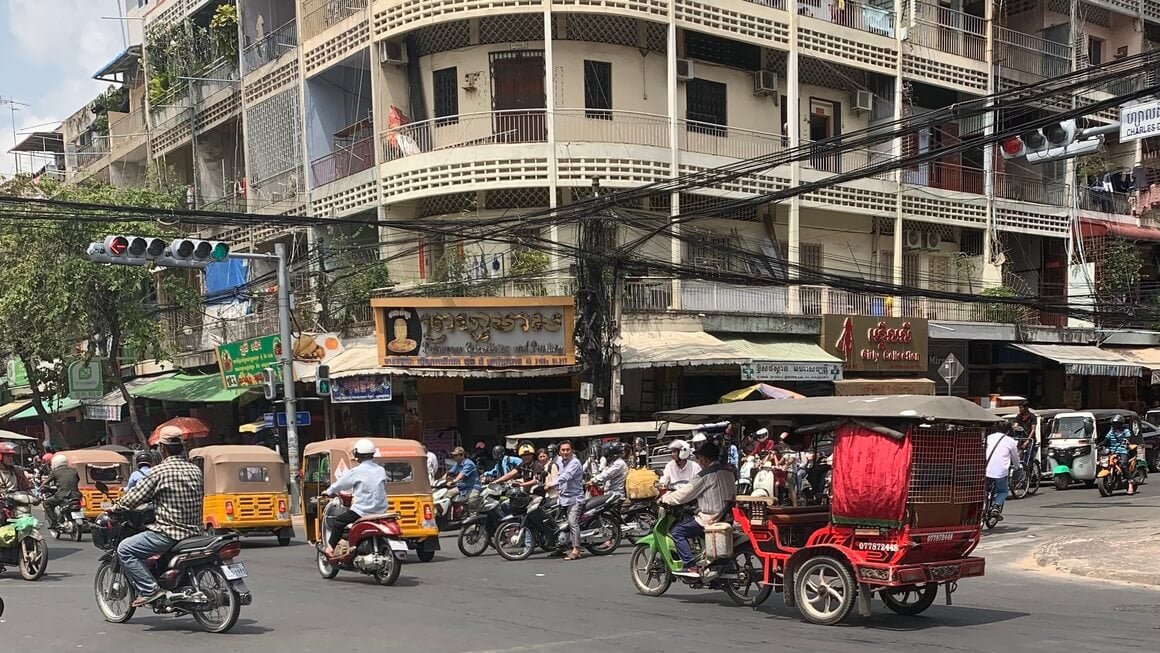
Photo: @joemiddlehurst
If you buy your motorcycle in Vietnam, then you’re able to take it to Laos and Cambodia without needing a special permit. However, you can’t take your Cambodian bought motorbike into Vietnam. Vietnam’s capital, Ho Chi Minh has an abundance of motorbikes you can purchase anywhere from $150 USD.
Take note that you can’t transport your motorcycle to the islands, so you’ll need a safe place to store it whilst you enjoy island life.
Hitchhiking in Cambodia
Hitchhiking in Cambodia is another fantastic option for getting around! You can have both good and bad experiences. I was picked up hitchhiking by a local, who just wanted to show me around. He gave me a mini-tour of his hometown on the way to our destination and genuinely just wanted me to enjoy my time in Cambodia.
Whereas, I had a different experience hitchhiking from Phnom Penh to Kampot. One guy wanted to charge me twice the price of a bus and thankfully another kind human took me the whole way without asking for anything.
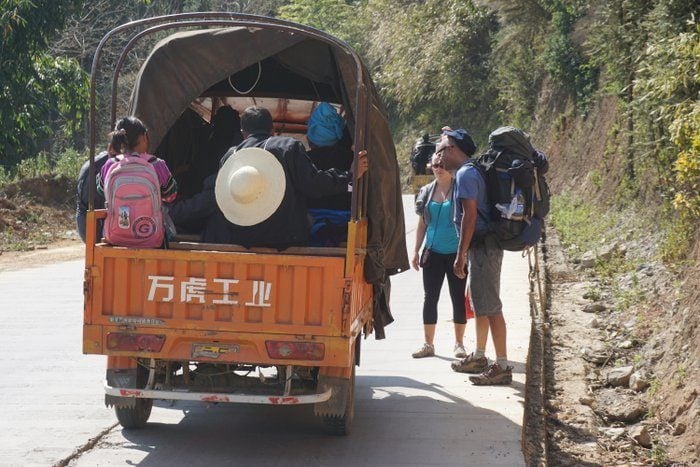
If you want to hitchhike whilst backpacking in Cambodia, make sure you have a sign (preferably in Khmer and English), are standing next to the main road, and there’s plenty of space for a car to pull over.
Onwards Travel from Cambodia
The same rules for overland travel apply as the entrance. Check out the first part of this section for more information on the overland border crossings. It is quite easy to get a cheap flight or bus across to Thailand, Vietnam, or Laos.
Many travellers also head to other Southeast Asia countries, like Indonesia or even onwards to work and backpack in Australia to save up for Southeast Asia Round 2!
Working in Cambodia
It’ll be a challenge for digital nomads staying in Cambodia. The WiFi in some areas of Cambodia is okay – particularly in major cities like Phnom Penh and Siem Reap. However, step outside the urban areas or onto the islands, and it’s jungle WiFi territory!
Volunteering in Cambodia is much easier to get into though. All over Cambodia, you’ll find opportunities for volunteering on farms, with kids, or various other projects and organisations.
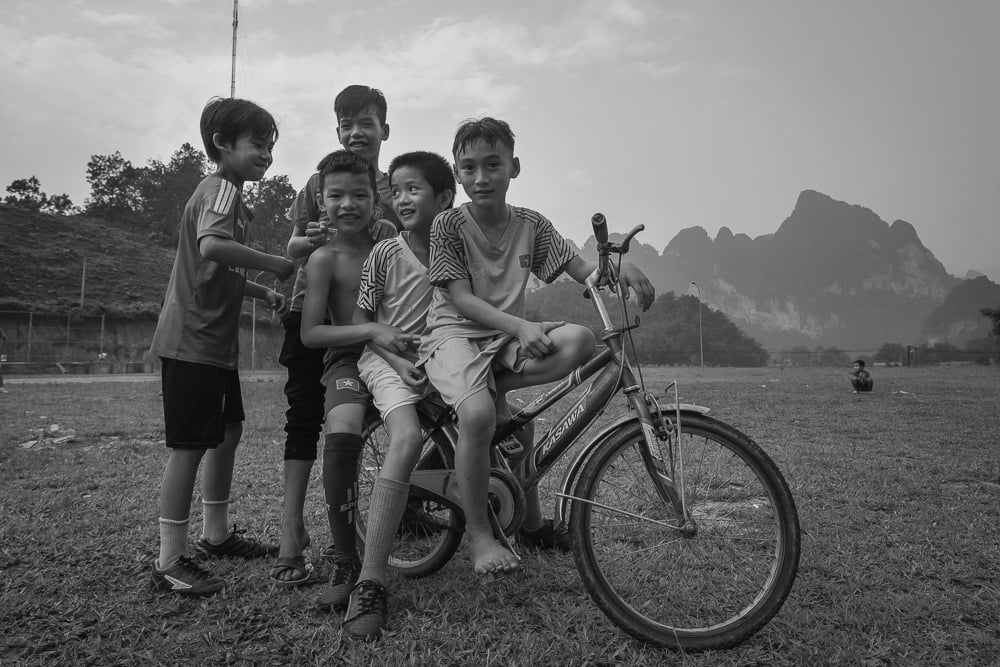

A new country, a new contract, a new piece of plastic – booooring. Instead, buy an eSIM!
An eSIM works just like an app: you buy it, you download it, and BOOM! You’re connected the minute you land. It’s that easy.
Is your phone eSIM ready? Read about how e-Sims work or click below to see one of the top eSIM providers on the market and ditch the plastic.
Grab an eSIM!Teaching English in Cambodia
Heaps of working travellers choose to teach English in Cambodia for a spell. English is a higly sought after skill by both adults and, particularly, for children.
In order to teach English in Cambodia, there are a few things you’ll need to obtain first:
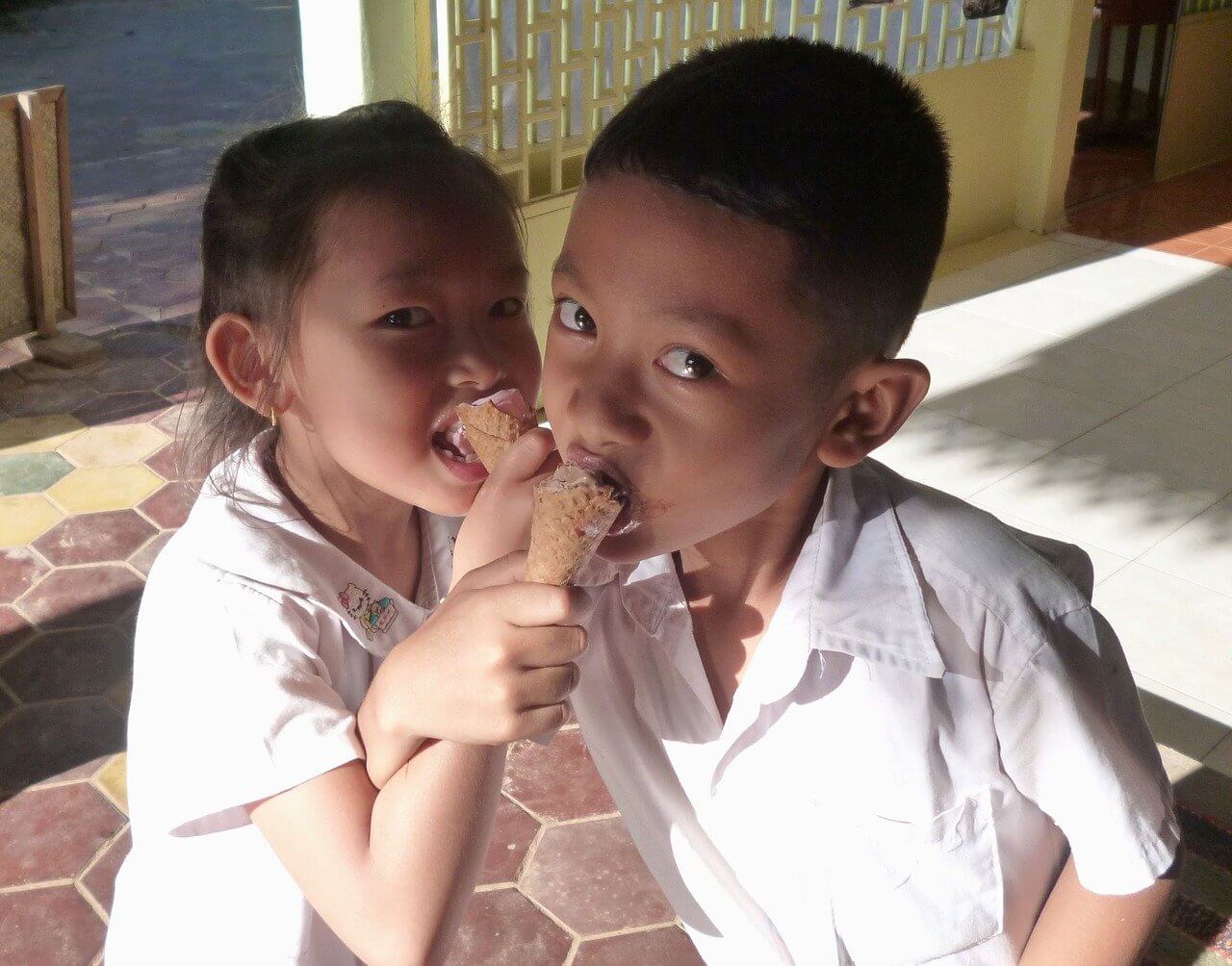
- An “ordinary” E-Class visa – Separate from the tourist visa, an E-Class visa is for people intending to stay in Cambodia for an extended period of time. It’s $35 for the initial 30 days and then you’ll need to get a visa extension.
- EB visa extension and work permit – You’ll need the work permit to get the visa extension first. It’s around $100 for the permit and can only be obtained through an employer ONCE you have found a job.
Once you have your work permit, you can apply for the EB visa extension – the extension applicable to most expats working in Cambodia. EB visa extensions can be taken in periods of 1, 3, 6, and 12 months at $50/$80/$160/$290 respectively, and you’ll need a stamped letter verifying your employment to qualify. - A TEFL certificate – Now, you can find a job teaching English in Cambodia without a TEFL certificate. However, a TEFL certificate is going to open up a lot of doors with both available jobs and the relative payscale you can expect. It’s a strong recommendation that anyone who wants to work as an English teacher abroad should get one.
There are a lot of choices for acquiring a TEFL degree, however, I recommend running the course through MyTEFL. Not only are they a highly reputable and effective company, but Broke Backpacker readers get a 50% discount (using the code PACK50)!
Then, you’ll be able to stay in Cambodia… forever.
Volunteer in Cambodia
Volunteering overseas is a great way to experience a culture whilst doing some good in the world. There are lots of different volunteer projects in Cambodia which you can join ranging from teaching, to animal care, to agriculture to pretty much anything!
As one of the poorest countries in the world, Cambodia welcomes thousands of volunteers to help out in a number of areas. English teaching and social workers are in high demand throughout the country, but you’ll also find opportunities in hospitality, decorating, and digital marketing. Keep in mind you’ll need to apply for a ‘Type E – Ordinary Visa’ and a work permit in order to volunteer in Cambodia.
If you want to find volunteering opportunities in Cambodia, then we recommend that you Signup for Worldpackers – a volunteer platform that connects local hosts directly with traveling volunteers. As a Broke Backpacker reader, you’ll also get a special discount of $10 when you sign up. Just use the discount code BROKEBACKPACKER and your membership is discounted from $49 a year to only $39.
Volunteer programs run through reputable work exchange programs like Worldpackers are usually very well-managed and reputable. However, whenever you are volunteering, do stay vigilant especially when working with animals or children.
What to Eat in Cambodia
The Khmer food in Cambodia is absolutely delicious. Many Khmer dishes originate or are inspired by their neighbouring Asian countries. You will fall in love with the food whilst backpacking Cambodia.
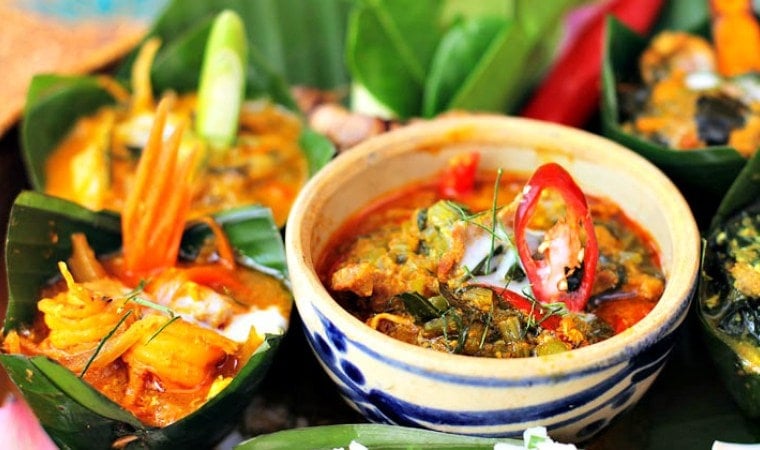
Khmer cuisine has a focus on fresh ingredients that create a harmony of flavours. Unlike neighbouring Thailand and other countries in the region, however, Cambodian dishes tend to be milder in heat with more weight given to tangy and pickled flavours. Much like other countries in the region though, you can expect plenty of rice.
Popular Cambodian Dishes
- Lok Lak– Is a delicious stir-fried beef dish, served on a bed of lettuce, red onion, cucumbers and tomatoes. The beef is cooked with garlic and tomato sauce. The dipping sauce consists of lime juice, sea salt and black pepper.
- Fish Amok– This is probably my all-time favourite Khmer dish whilst backpacking Cambodia. It’s a spicy fish coconut curry served in a banana leaf with a side of rice. Not only is this yellow curry cheap, but also absolutely delicious and a national culinary Cambodian tradition.
- Bobo– Is a local rice soup dish with spring onions and garlic, commonly eaten for breakfast. It’s a basic yet delicious start to your day served with garlic, beans, chilli, and lime.
- Lap Khmer– This is a delectable lime-marinated Khmer beef salad, may not be for everyone. The beef is either “cooked” ceviche style using lime juice or seared quickly. It’s quite spicy and has a great flavour with lemongrass, garlic, basil, mint and fish sauce. If you’re eating at a western friendly place then your beef will be cooked properly, however, if you’re eating locally you may be eating rare beef.
- Khmer Red Curry– This dish is quite similar to a Thai red curry but without the overpowering chilli burn. It’s made with your choice of meat or fish, with eggplant, lemongrass, green beans, potatoes, coconut milk and kroeung (Cambodian spice). The Khmer red curry has a French influence and is typically served with bread.
You could also try booking a Cambodian Cooking class to get the insider scoop on how the Khmer get their dishes so damn delicious!
Cambodian Culture
Cambodian people are friendly and inquisitive. You can expect to be greeted with big smiles!
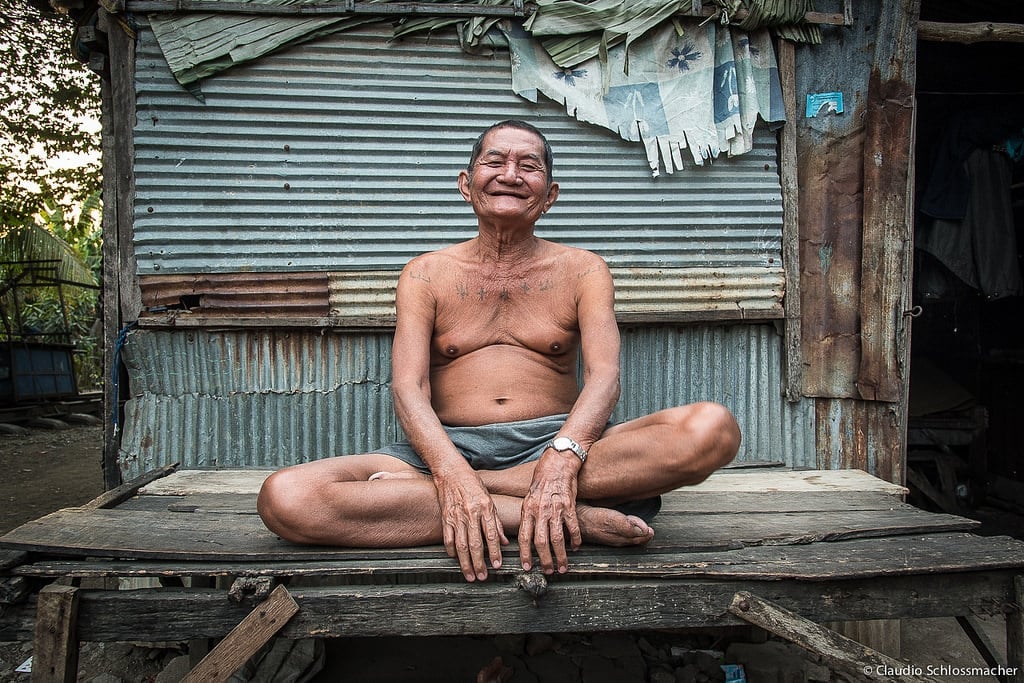
90-95 percent of the people are Khmer ethnic.
The Khmer Loeu are the non-Khmer highland tribes in Cambodia, and the Cham people in Cambodia descend from refugees of the Kingdom of Champa, which once ruled much of Vietnam between Gao Ha in the north and Bien Hao in the south.
Useful Travel Phrases for Cambodian
Here are some Khmer travel phrases for travelling around Cambodia. The locals will appreciate your attempts to learn the local language with a huge smile on their faces.
- Hello – Jum-reap soo-a
- How are you? – Tau neak sok sapbaiy jea teh?
- Goodbye! – Joom-reap leah
- Yes – Baat (men)/ Chaas (Women)
- No – Dteh
- Please – Suom mehta
- Thank you – Or-koon
- Sorry/excuse me – Sohm dtoh
- No plastic bag – kmean thng bla ste ch
- No straw please – kmean chambaeng saum
- No plastic cutlery please – kmean bla ste ch kabet phka
- I need a doctor – K`nyom trouv krouh peit
- I’m lost – K’nyom vung vehng plouv
- I would like – Khnyom sohm___
- How much does this cost? – T’lay pohnmaan?
Dating in Cambodia
Cambodia is typically a very conservative society and will rarely show any public display of affection (PDA). Chatting up girls is not really a thing in Cambodian culture, however, it’s normal to occur in major cities like Phnom Penh and Siem Reap where there are a lot of bar girls looking to make friends with foreigners.
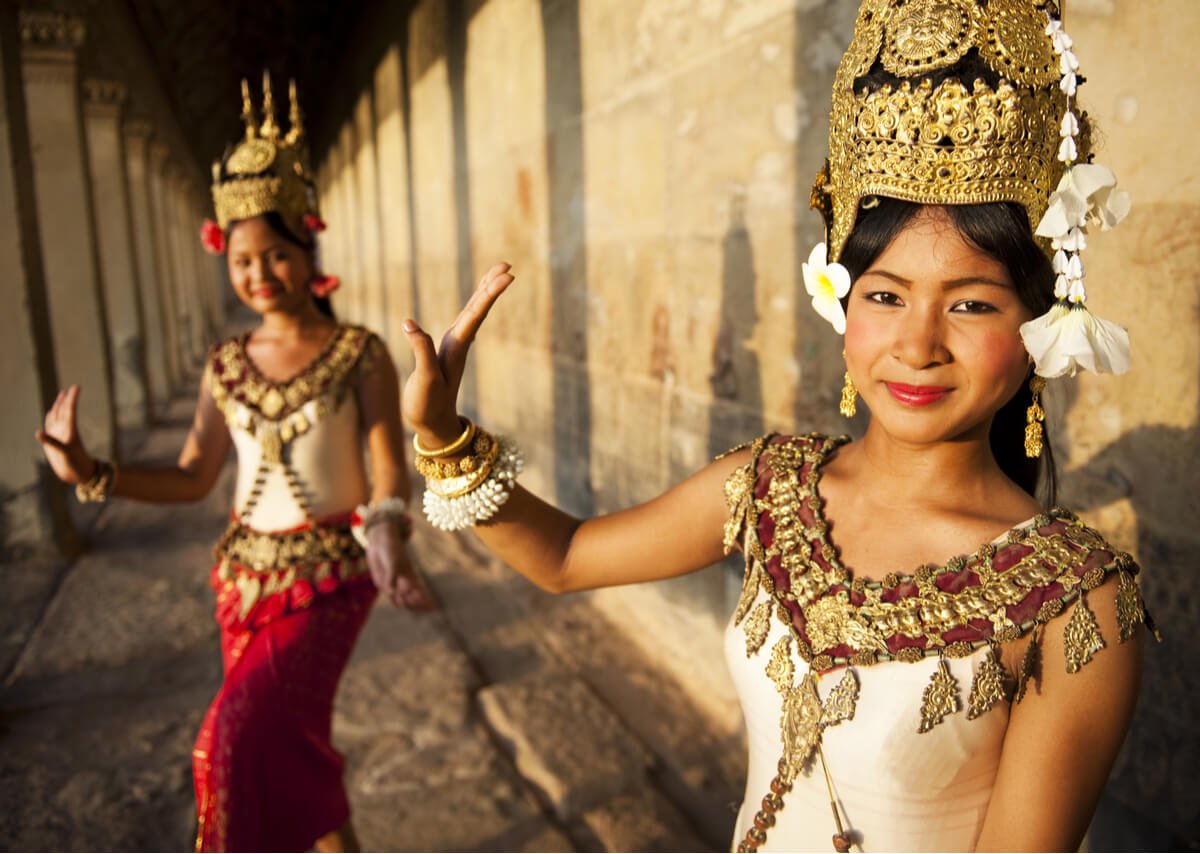
Watch your wallet and remember that all humans deserve to be treated with respect. Don’t get drunk and do anything you would be ashamed to tell your Mum.
The people in major cities are generally less conservative and are open to PDA. Although Cambodia is a conservative society, it’s ironically easy for a foreigner to score a “date”. You do need to be very careful though as sexually transmitted diseases, in particular, HIV and AIDS are quite common.
Books to Read About Cambodia
Below are my favourite books set in Cambodia:
- A Cambodian Prison Portrait – There are many myths about the Khmer Rouge’s bloodthirstiness and brutality, but there was at least one place where they all were real: Security Prison 21, the secret police’s killing machine. Of the 14,000 or so prisoners who were brought there for questioning, only a handful survived. One of them was the artist Vann Nath (1946-2011). In this thin little book, he describes his horrifying year behind the barbed wired walls of S-21.
- The Lost Executioner – The head of S-21, Kang Kek Iew, AKA Comrade Duch, is central in this remarkable book. In 1997, the photographer and journalist Nic Dunlop more or less stumbled upon Duch, who had been hiding since the fall of the Khmer Rouge in 1979.
- Phnom Penh: A Cultural History – This book provides a colourful account of the troubled history and appealing culture of Cambodia’s capital city. It sheds light on Phnom Penh’s early history when first Iberian missionaries and freebooters and then French colonists held Cambodia’s fate in their hands.
A Brief History of Cambodia
Cambodia has a turbulent history with numerous invasions and battles throughout the years. If you’re backpacking Cambodia, It’s important to have knowledge of their history & how they’ve progressed to be the country they are today.
During the 18th century, Cambodia found itself squeezed between two powerful neighbours, Thailand and Vietnam. The Thais invaded Cambodia several times during this period. In the last years of the 18th century, the Vietnamese also invaded Cambodia. The Cambodian king was forced to look to the Thais for protection; in return, Thailand took north-west Cambodia.
Cambodia soon turned to France as a protectorate from both Thailand and Vietnam. They were under French rule for the next 90 years, where some economic development took place. They built roads, railways and helped develop the rubber industry. Cambodian nationalism grew during the 1930s as the French imposed heavy taxes on the Cambodian people.
During the early 1940s (WWII) the Japanese invaded and occupied Cambodia until 1945 when the French returned as a protectorate. A new constitution was formed allowing Cambodia to have political parties, which led to communist guerrillas to campaign against the French. In 1949 Cambodia became semi-independent and soon after King Sihanouk took personal control of the country. Cambodia became fully independent in 1953 and was renamed the Khmer Republic in 1970.
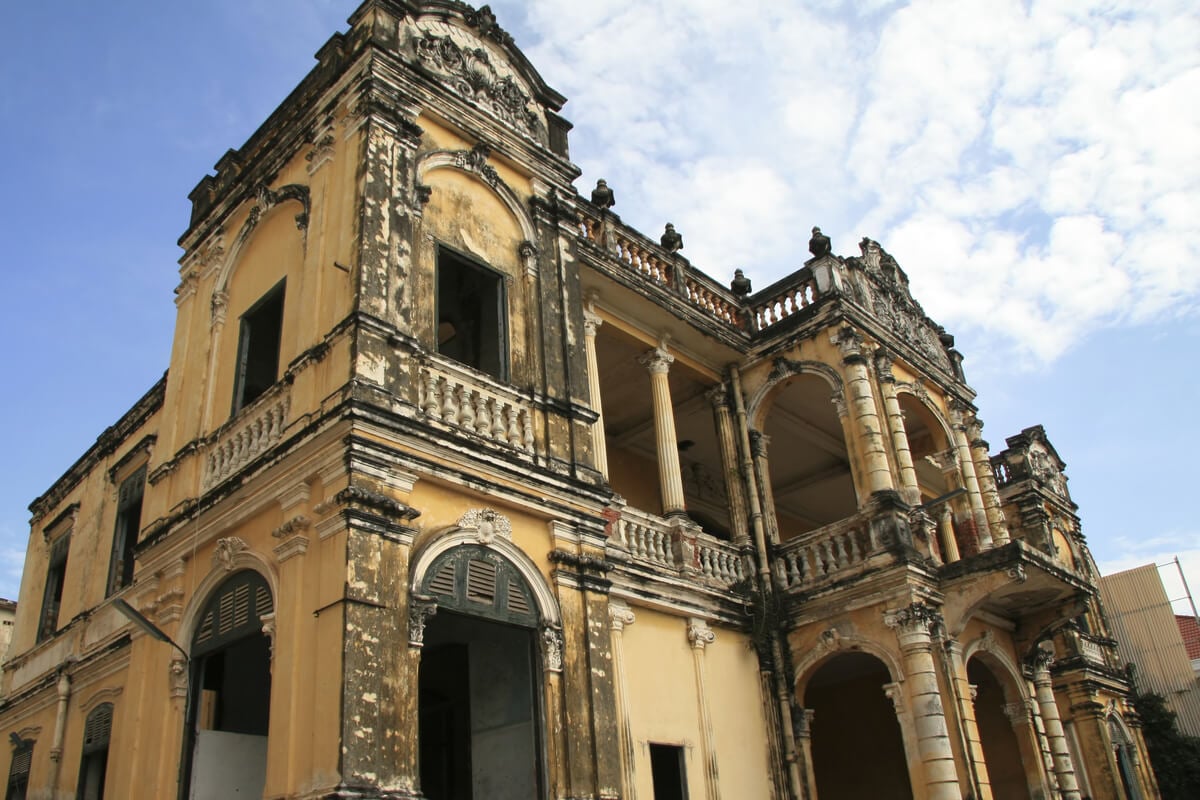
During 1969 the US began a secret bombing crusade against the North of Vietnam on Cambodian soil. Prime Minister Lon Nol then overthrew King Sihanouk in a coup to proclaim the Khmer Republic. Cambodian soldiers were sent to fight the North Vietnamese on home soil. However, the guerrilla/communist movement slowly made progress, leading to the US commencing bombing campaigns against the communist Khmer Rouge guerrillas.
The Khmer Rouge Regime and the Cambodian Genocide
On the 17th of April 1975, the Khmer Rouge, led by Pol Pot, captured Phnom Penh and renamed the country Kampuchea. This was the beginning of the world’s worst mass killings of the 20th century. Pol Pot wanted to wipe history clean and start from ‘Year Zero’.
Everyone was forced to abandon their houses, jobs, and possession, and move to the countryside to work in agriculture on collective farms. Pol Pot had a totally unrealistic target of double its agricultural output, to produce 3 tones of rice per hectare, which was literally impossible. Everyone had to work long hours of little food, which led to many falling ill or dying from exhaustion or malnutrition.
Everyone from the intellectuals to the uneducated was imprisoned, tortured, killed and dumped in mass graves. People, who spoke a foreign language, wore glasses, or had any kind of higher education were executed. Religion was banned, punishable by death, and family relationships were forbidden. People were executed for the smallest infringements, like foraging for food, being too lazy and complaining.
How many people were killed during the Khmer Rouge is unknown, but it’s estimated that between 1.5 – 3 million people perished.
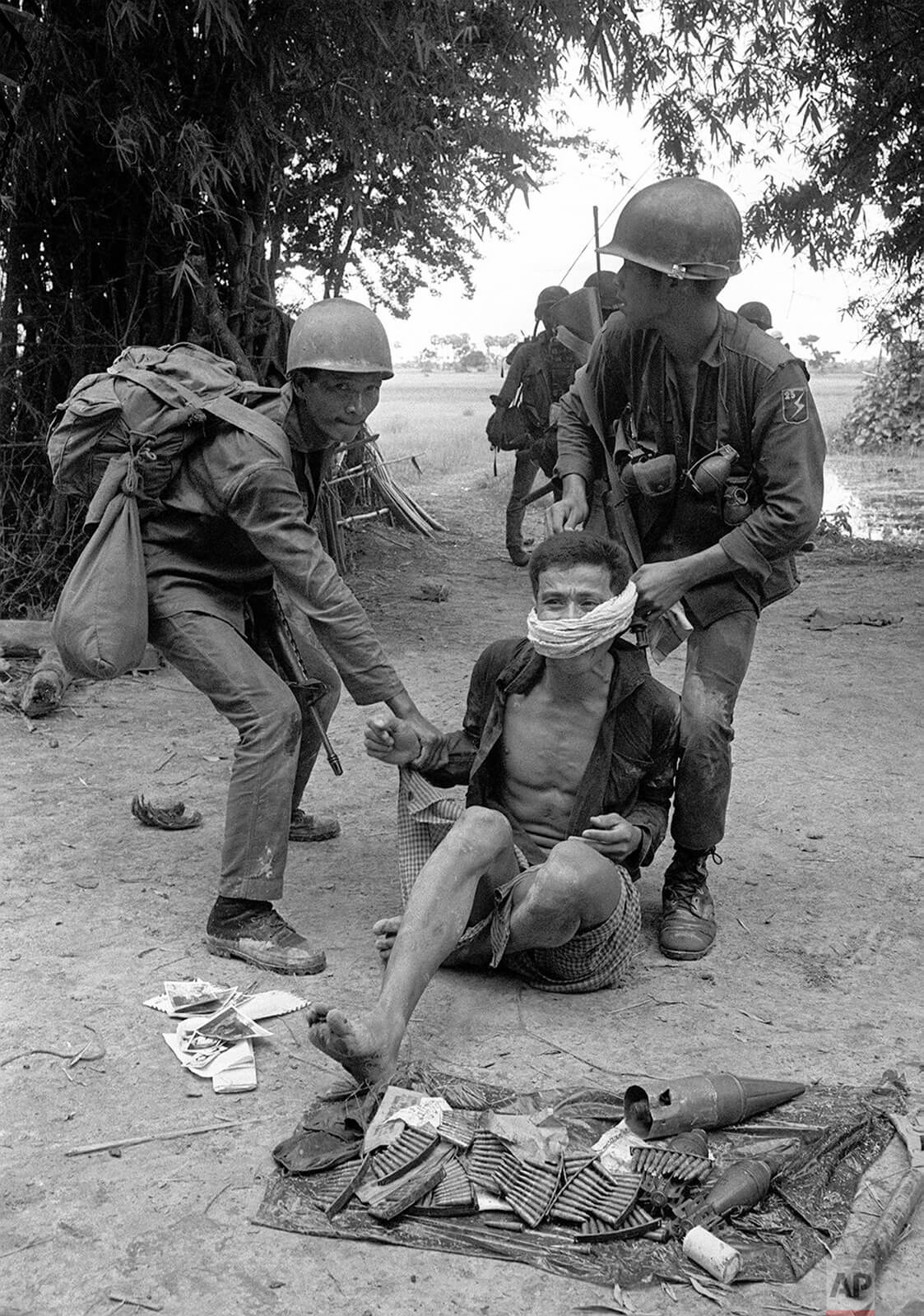
Photo: manhhai (Flickr)
The Vietnamese invaded Cambodia in 1978 to terminate the Pol Pot regime. The Khmer Rouge fled to the border of Thailand, to re-establish The People’s Republic of Kampuchea. They were welcomed with open arms by Thailand, who also feared a Vietnamese invasion. However the guerrilla war continued, the party was still officially internationally recognized and retained their seat in the United Nations.
In 1989 Vietnam withdrew from Cambodia and communism was abandoned. A provisional government took power until the 1993 elections where they framed a constitution. In 1991 the Paris Peace Agreement was signed, reinstating Sihanouk to be head of state. The monarchy was soon restored, Buddhism was recognized as the national religion and Sihanouk became king once again. The country was renamed “The Kingdom of Cambodia” and the Khmer Rouge obviously lost their seat in the UN.
Thousands of guerrillas involved in the Khmer Rouge surrendered to the government, in a bid for amnesty. Those involved in the Khmer Rouge were put on trial and Pol Pot was sentenced to life in prison due to his horrendous war crimes. Pol Pot died shortly after in 1998, returning peace to the Kingdom of Cambodia.
Cambodia has progressed and developed considerably in a short amount of time. Although it’s still a relatively poor country, the economy is growing rapidly. The textiles and tourism industry is booming, oil was discovered off the Cambodian coastline, which assures Cambodia a prosperous future.
Some Unique Experiences in Cambodia
Are you looking for some extra quick info about visiting Cambodia? Then here are some cool activities you should consider doing!
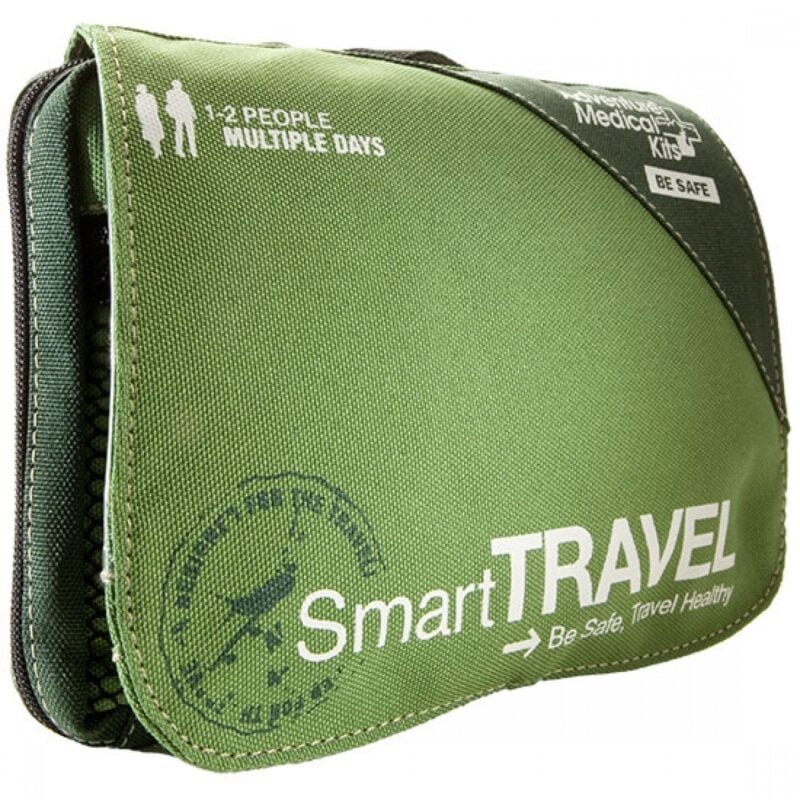
Things go wrong on the road ALL THE TIME. Be prepared for what life throws at you.
Buy an AMK Travel Medical Kit before you head out on your next adventure – don’t be daft!
Buy on REITrekking in Cambodia
Trekking is not typically popular in Cambodia, therefore they tend to be quite expensive. The are two main treks when backpacking Cambodia is Virachey and Phnom Samkos.
Virachey is a common trek when backpacking Cambodia. It’s an environmentally friendly 7-day Ecotour. You trek through remote villages, through the Yak Yeuk Grasslands up to Mera Mountain, finishing right near the Laos border.
Veal Thom Grasslands boats the most spectacular views of the wild, unexplored mountainous border of Laos and Vietnam. Throughout your trek you’ll be spotting gibbons, hornbills, exploring grasslands and swimming in rivers. It’ll be a truly authentic and incredible Cambodian experience.
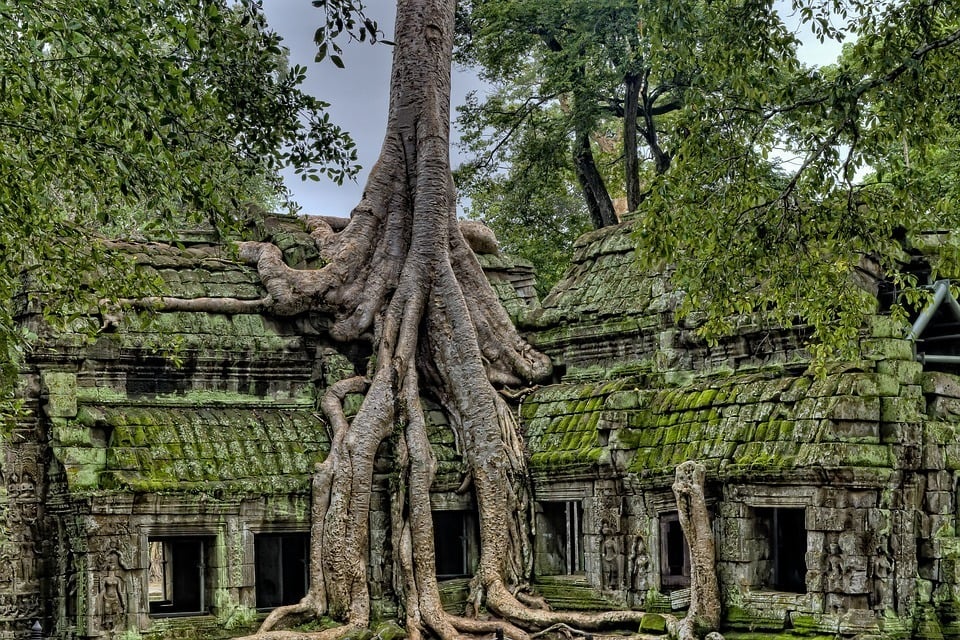
If you’re looking for a world-class trek that’s completely off the beaten path, then head to Phnom Samkos, Cambodia’s second highest peak. Instead of opting for a tour, arrange it yourself with rangers in Promouy town. It’ll be expensive but one hell of an adventure!
There are no defined trails, so you’ll have to use machetes to make your own trail up to the mountain peak. It’s quite a dangerous trek as it’s extremely remote and there are potential landmines. You’ll be exposed to everything the jungle offers including leeches and wild animals like elephants.
My friend actually woke up to elephants congregating around their campsite whilst doing the Phnom Samkos trek. The national park insists on you taking two rangers armed with AK47’s on your 3-day trek to the summit. Sounds like a once in a lifetime experience right?
Joining an Organised Tour in Cambodia
For most countries, Cambodia included, solo travel is the name of the game. That said, if you are short on time, energy, or just want to be part of an awesome group of travellers you can opt to join an organized tour. Joining a tour is a great way to see a majority of the country quickly and without the effort that goes into planning a backpacking trip. However—not all tour operators are created equal—that is for sure.
G Adventures is a solid down-to-earth tour company catering to backpackers just like you, and their prices and itineraries reflect the interests of the backpacker crowd. You can score some pretty sweet deals on epic trips in Cambodia for a fraction of the price of what other tour operators charge.
Check out some of their awesome itineraries for Cambodia here…
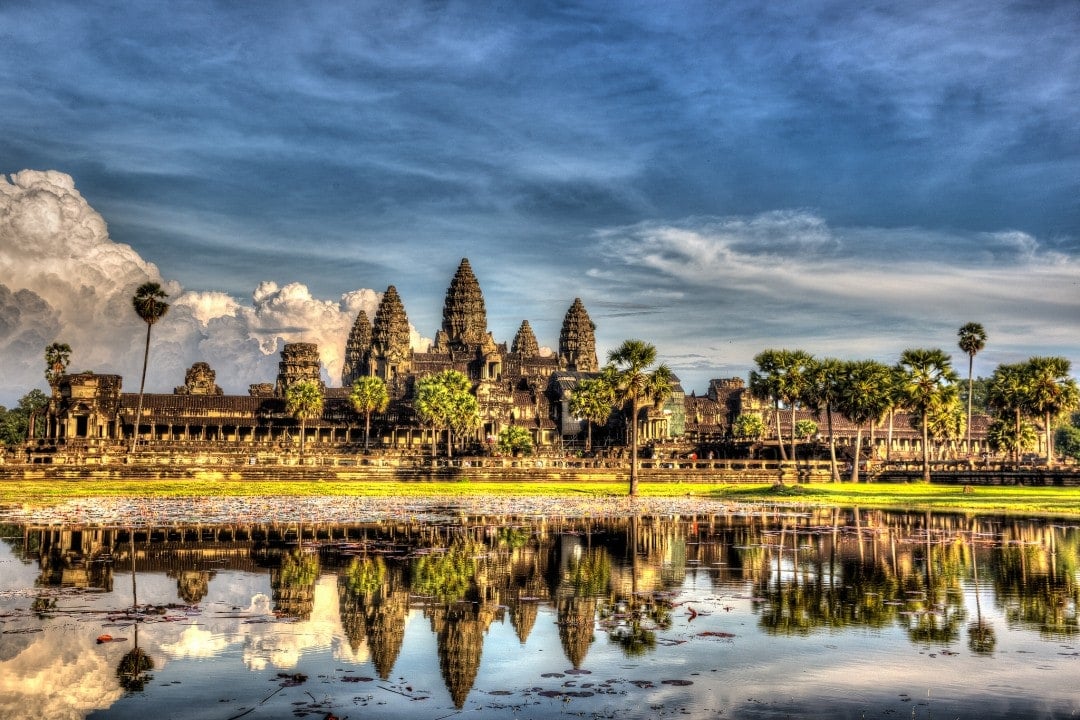
Final Advice Before Visiting Cambodia
Cambodia is a beautiful country to travel. There are just a few things you need to keep in mind before visiting.
Political Issues to be Aware of in Cambodia
Cambodia is still in the midst of political uncertainty as the government campaigns for a 2018 election. The government has misused the justice system to harass and punish civil society and silence critics.
Human right advocates, public intellectuals, NGOs and the opposition have recently been targeted by this autocratic government. Although the political system is corrupt, it shouldn’t affect or impact your travels to Cambodia. Just stay updated on the current political situation in Cambodia.
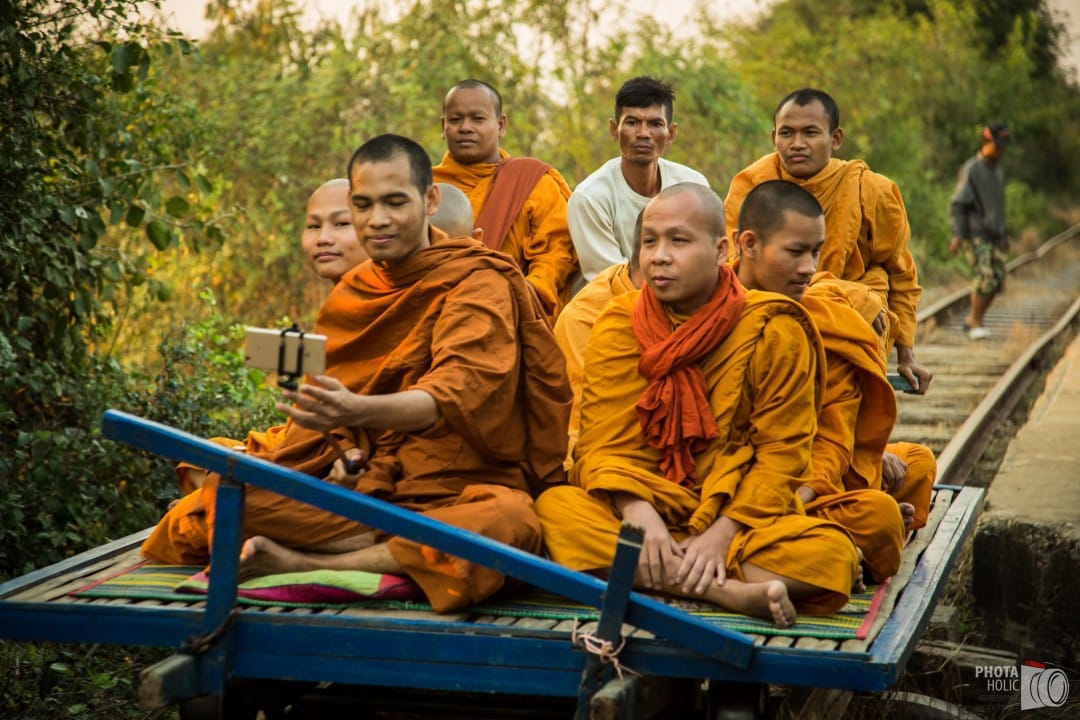
Be Good to Cambodia
Writing your name in black marker on temples, chugging beer while shirtless and swearing loudly, visiting unethical animal attractions? You, Sir, are a twat. Luckily, most backpackers don’t fall into this category but, when you’re out and about and have had a few too many drinks, it can be easy to embarrass yourself.
It’s easy to get carried away in Southeast Asia, everything is so damn cheap and so much fun. I’m in no way the perfect traveller; I’ve been the drunken idiot on the street. I know first hand just how hard it is to be the one person in a group to say no when somebody comes up with a stupid idea that, for some reason, everybody is down for.
By no means am I telling you not to drink, smoke, and party. Do it and love it. Just don’t get so drunk you turn into an imbecile your mum would be ashamed of.
Wear a helmet when you hop on a motorbike in Asia. The local people are sick of scraping foreigners off the road and, trust me, you don’t look cool for not wearing a helmet.
Humans are humans; treat people you meet along the way with the same respect you would show your friends and family back home. You are not superior to anyone including the girls/guys walking the streets. Luck of the draw is the only true difference separating you and them.
Go to Asia and have the time of your life, do the things you’ve dreamed of but be respectful along the way. Travelling is a privilege many don’t get to enjoy – use it for good.
Cambodia has a tragic, turbulent past, but as they recover and move on, they are welcoming tourists with open arms and wide smiles. Beautiful beaches, temples, and undiscovered hikes are reason enough to travel to Cambodia! A slice of happy pizza and a bombastic sunset to accompany is just the icing on the cake.
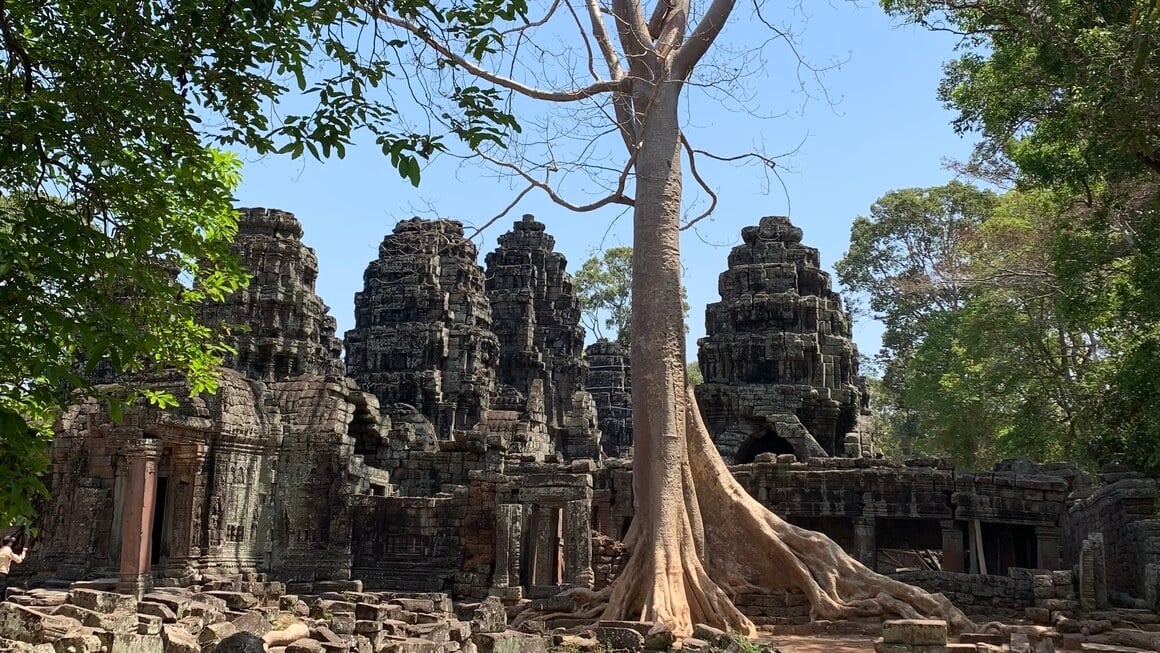
Photo: @joemiddlehurst

And for transparency’s sake, please know that some of the links in our content are affiliate links. That means that if you book your accommodation, buy your gear, or sort your insurance through our link, we earn a small commission (at no extra cost to you). That said, we only link to the gear we trust and never recommend services we don’t believe are up to scratch. Again, thank you!


